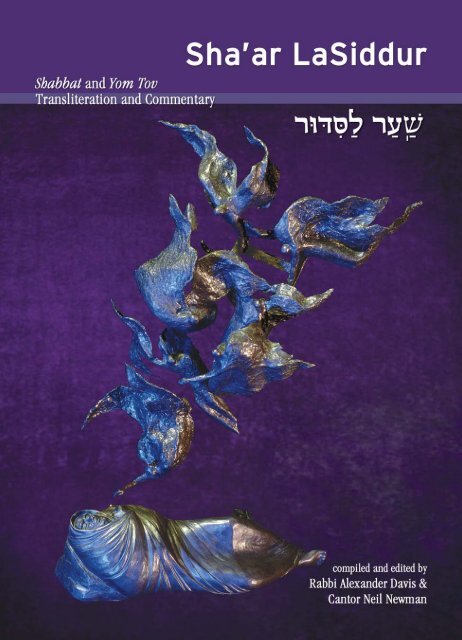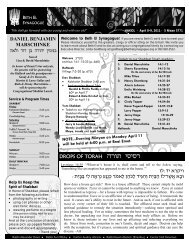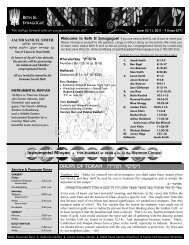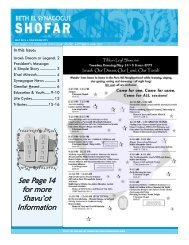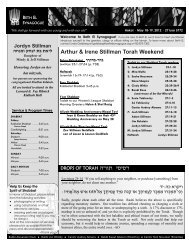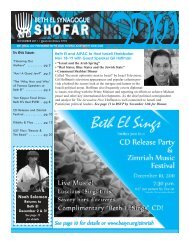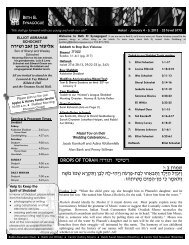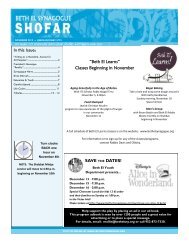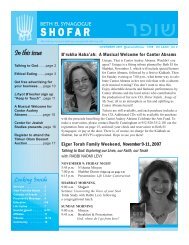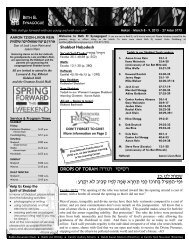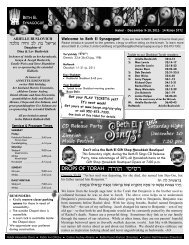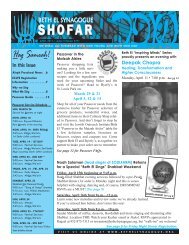You also want an ePaper? Increase the reach of your titles
YUMPU automatically turns print PDFs into web optimized ePapers that Google loves.
TABLE OF CONTENTSINTRODUCTIONTable of Contents 1Pronunciation and Transliteration Key 2Welcome to <strong>Beth</strong> <strong>El</strong> <strong>Synagogue</strong> 3Conservative Judaism 4A Word about Jewish Prayer 5Rituals, Rejoicing and Respect 10SERVICESShabbat EveningKabbalat Shabbat (Welcoming Shabbat) 12Ma’ariv (Evening Service) 16Shabbat MorningBirkhot Hashahar (Early Morning Blessings) 23P’sukei D’Zimra (Verses of Song) 26Shaharit (Morning Service) 29Torah Service 37Hallel (Psalms of Praise) 43Musaf (Additional Amida) 47Minha (Afternoon Service) 55HAVA NASHIRA! – LET’S SING! 613
PRONUNCIATION AND TRANSLITERATION KEYThe transliteration in this booklet has been standardized for ease of use.The pronunciation follows the Sephardi/Israeli usage. Hebrew words aregenerally accented on the final syllable. When the accent falls on the next-to-lastsyllable (the exception), the syllable will be marked in bold to assist you withaccurate pronunciation. Note also that transliterations of prayer texts are presentedwithout repetition according to specific melodies; song texts in the HavaNashira section, however, do include repetitions following the most familiarmelodies. Note: three dots […] indicates that davening continues individually.The following transliteration conventions were followed:a as in fAther o as in Ozonee as in Education u as in rhUbarbei as in Asymmetric ’ as in It (sh’va)i as in EAting kh for the gutteral letter as in BaruKHh for the guttural letter also as in HutzpahHebrew Equivalentslmnsalmost silent/gutturalpftzkrshstsilentbvgdhvzhtykkh2
WELCOME TO BETH EL SYNAGOGUE<strong>Beth</strong> <strong>El</strong>, which means “House of God,” is a Conservative congregation.Founded in 1924, today it numbers 1,300 member families. Our SpiegelSanctuary, like all Jewish houses of worship, faces toward Jerusalem. It wasbuilt in 1970 to represent the Ohel Mo’ed (Tent of Meeting) that accompaniedthe Children of Israel throughout their desert wanderings. Its rafters aredesigned to lead your attention up toward the heaven and its natural oak wallsare meant to create a feeling of warmth and intimacy. The stained glass windowdepicts the Israelites escaping Egyptian slavery and heading for Mt. Sinai.This window also incorporates the vision of the prophet Isaiah, who said: “Aday will come when all shall beat their swords into plowshares, their spearsinto pruning knives; when nation shall not lift up sword against nation, neithershall they learn war anymore.”Just below the stained-glass window is the ner tamid (eternal light), whichsymbolizes God’s eternal presence. The ner tamid is in the shape of theworld. It in turn rests above three Hebrew words, which correspond to theTalmudic saying that the world rests on Emet (Truth), Din (Justice) andShalom (Peace). On the left side of the bima (pulpit) is a sculpturedmenorah whose stem spells out the Hebrew words “Beit <strong>El</strong>” (House of God).On the right side of the bima is a sculptured burning bush with the Hebrewquotation: “The bush was not consumed,” symbolizing over 3,500 years ofJewish living.Like the Spiegel Sanctuary, the Fiterman Chapel offers a warm, intimate spacefor communal worship. The chapel contains twelve windows symbolizing thetwelve tribes of biblical Israel. Originally hung in the first <strong>Beth</strong> <strong>El</strong> building onMinneapolis’ “old north side,” these windows depict symbols of Jewish holidays.On the right side of the bima, above the hazan’s (cantor’s) stand, is amenorah. Written to the left of the bima are the opening words of each of theTen Commandments.3
An Overview of ServicesA typical Friday evening service has two primary parts:1. Kabbalat Shabbat is a collection of Psalms and poems that help us leavethe weekday behind and enter the spirit of Shabbat.2. Ma’ariv, the evening service, contains the sh’ma and its surroundingblessings, a private meditation known as the amidah (“standing prayer”)and a series of concluding prayers.A typical Shabbat morning service has four primary sections:1. Birkhot HaShahar and P’sukei D’zimra (“morning blessings” and “versesof song”) are a collection of Psalms and prayers that help us enter the moodof prayer.2. Shaharit, the morning service, follows the same thematic format as thema’ariv service (see number 2 above). Its two primary elements are: 1) thesh’ma and its blessings and 2) the amidah.3. During the Torah service, a section (parasha) of the Torah (the FiveBooks of Moses) is chanted. It is followed by the Haftara, a reading fromthe Prophets that is thematically related to the Torah reading. The Torahscrolls are removed from and returned to the aron hakodesh (the holy ark)with songs and prayers.4. The Musaf service highlights the uniqueness of Shabbat and holidays byincorporating an additional amida into the morning service (musaf literallymeans “additional”). Its recitation connects us to the worship of our ancestors2,000 years ago.At the conclusion of a morning service, kiddush and motzi (prayers made overwine and bread) are recited. As we move to the Gruman Social Hall to enjoysome sweets and sometimes a light lunch, we wish each other a “shabbat shalom”(a peaceful Sabbath) or “hag samei’ah” (happy holiday). Please join us.6
The Building Blocks of Jewish PrayerThere are two primary components of every ma’ariv (evening) and shaharit(morning) service: the sh’ma and the amida. At its most basic, the sh’ma is aprayer directed to the community that speaks about God. Along with its surroundingblessings, it tells us who God is and how God acts in the world. The amida,on the other hand, is a prayer in which we speak to God and see ourselves asstanding in God’s presence. Each prayer has its own structure and choreographythat reflect its unique meaning.The Sh’ma and its Blessings can be outlined as follows:Bar’khu- Call to prayer1. Yotzer Or: Creation2. Ahava: RevelationSh’ma:A. Sh’ma & V’ahavta: Adonai is One.B. V’haya Im Shamo’a: We serve God by observing mitzvot.C. Vayomer: Mitzvot lead us to holiness.3. G’ula: Redemption4. Hashkiveinu: Peace (evenings only)The sh’ma consists of three paragraphs (letters A, B, C, above), which are acommunal expression of God’s oneness and which outline our obligation to loveand serve God. These three paragraphs are direct quotations from the Torah.The blessings surrounding the sh’ma (numbers 1 - 4) emphasize: God as creatorof the universe; God’s love for the people Israel as demonstrated through the givingof Torah; God’s redemption of Israel from Egyptian slavery and our hope forultimate redemption in the messianic era.This entire prayer unit, known as sh’ma uvirkhoteha (the sh’ma and its blessings),is introduced with the bar’khu, an invitiation to gather together for prayer.7
The amida can be outlined as follows:Sh’vahot (Praise)1. Avot: recalling our ancestors2. G’vurot: describing God's powers3. K’dusha: proclaiming God's holinessK’dushat Hayom (Sanctification of the Day)4. God sanctifies Shabbat and/or Yom TovHoda’ot (Thanksgiving)5. Avoda: asking for our prayer to be accepted6. Hoda’a: prayer of thanksgiving7. Shalom: prayer for peaceThe amida is a silent meditation that has three primary parts. The three b’rakhotat the beginning (numbers 1 - 3) and at the end (numbers 5 - 7) of the amidaare identical each time the prayer is recited throughout the day, week and year.The middle section (number 4), however, varies. On a weekday, the middle sectionconsists of 13 requests (bakashot) for such things as health, prosperity andjustice. On Shabbat and holidays, these 13 requests are replaced by one b’rakhathat praises God for sanctifying the Sabbath or Festival.From Shabbat to Shabbat, our t’fillot (prayers) are largely the same. The serviceitself is “fixed” (in Hebrew, keva): services happen at a set time of day, the structureand the words themselves are mostly unchanging. We, on the other hand, aredifferent week to week. World events and interactions with friends and familycontinually shape and reshape who we are. When we approach our davening(worship) with kavanah (focus, concentration), the words of the siddur, though“fixed,” can appear renewed and refreshed.For a fuller examination of Jewish prayer, see the introduction to Siddur SimShalom, Or Hadash: A Commentary on Siddur Sim Shalom, or choose a bookon the book cart, which is located in the Ring Lobby. For a glossary of importantHebrew words and phrases, see pages 403 - 404 in Siddur Sim Shalom.8
Music Traditions<strong>Synagogue</strong> music is central to making prayer meaningful. Recitation withoutmusic is dry and monotonous. Chanting our t’fillot (prayers) adds color andinterest and often a fresh interpretation of the text.The music at <strong>Beth</strong> <strong>El</strong> generally follows the traditions of Ashkenazi Jewry(Jews from Eastern Europe). Ashkenazi <strong>Synagogue</strong> music can be grouped intofour categories:1. cantillation - the chanting of biblical text: Torah (first Five Books),Haftara (the Prophets) and M’gillot (from the Writings);2. MiSinai Tunes - holiday melodies developed from 11th to 14thcentury Western Europe which have since become universally accepted;3. nusah hat’filla - prayer modes devised in Eastern Europe, standardizedby the end of the 18th century; and4. melodies, niggunim and choral arrangements - composed inrecent centuries by individuals in their respective Jewish communities;melodies may vary even from congregation to congregation within agiven community.<strong>Synagogue</strong> music that has become accepted over time roots us in our past. At thesame time, because all music is a reflection of the time and place it is composed,the repertoire of synagogue music continues to grow and expand. Newer tunesemployed at <strong>Beth</strong> <strong>El</strong> tie us to the present and invite us to examine our liturgy withfresh eyes and ears. As you participate in the chants and melodies of our service,we hope you will come to feel a measure of the meaning and spirituality engenderedby centuries of singing and davening.For additional background on Jewish synagogue music, refer to Heritage ofMusic by Judith Kaplan Eisenstein, Concise Encylopedia of Jewish Music byMacy Nulman and Off the Willows by Avraham Soltes.9
RITUALS, REJOICING AND RESPECTTraditional PracticesHead Covering: In keeping with tradition, all men are asked to keep their headscovered in the synagogue. This serves as a sign of reverence and awareness ofbeing in God’s presence. Kippot (head coverings) or yarmulkes (Yiddish) areprovided for your use if you do not have your own. They are located at theentrances of the chapel and main sanctuary. Women are invited to wear a headcovering and often do so when ascending the bima for an honor.Prayer Shawl: A tallit (prayer shawl) is worn by Jewish men and some Jewishwomen. Following the biblical commandment to “make tzitzit (knotted fringes)on the corners of garments,” the tallit and its tzitzit represent God’s protectingshelter and the 613 mitzvot (commandments) incumbent on Jewish adults.Standing: During certain prayers, Jews stand, bow and sometimes sway back andforth (shukkel). We stand out of respect for the Torah or during prayers that askus to imagine ourselves speaking directly to God. When the congregation as awhole rises, we ask all who are able to rise. During the individual mourner’skaddish, only mourners are required to stand. Bowing serves as a sign of humilityand reverence. Congregational singing, the cadence of the Hebrew poetry,becoming enwrapped in the power and beauty of the prayers may all move adavener (worshipper) to sway back and forth.S’mahot (Celebrations)Bar and Bat Mitzvah: On most Shabbatot, we are privileged to celebrate a bar orbat mitzvah. Literally, “son/daughter of the commandment,” this life cycle celebrationrepresents an initiation into the responsibilities and privileges of Jewishadulthood. It offers an opportunity for the bar or bat mitzvah to lead services,chant Torah and Haftara and to give an interpretation of the Torah reading. Inaddition, the rabbis and the child’s parent(s) use this occasion to share words ofwisdom with the bar or bat mitzvah.10
Weddings: Upcoming weddings are celebrated with an aufruf. Literally, “goingup,” an aufruf is an opportunity for a bride and groom to demonstrate theircommitment to establishing a Jewish home by going up to the Torah to recite thetraditional blessings. A Jewish wedding is an occasion for the Jewish communityto rejoice. We do so by showering the couple with sweets (thrown softly!), singingand offering a special blessing.Other S’mahot: Occasionally, we celebrate a birth, a wedding anniversary or anupcoming trip to Israel during services. Each celebration is accompanied byappropriate blessings and simha songs (words for which can be found beginningon page 61).Derekh Eretz (Proper Conduct)Derekh Eretz (literally, “the way of the land”) refers to the correct and respectfulway of being and behaving. By practicing derekh eretz in synagogue, school,home, workplace, etc., we strive to create a society built on fundamental Jewishvalues of kindness, courtesy and modesty.Shabbat and holidays are meant to be “holy days,” days set apart from the rest ofthe week. To create an atmosphere of k’dusha (sanctity) and in observance ofthe mitzvot of Shabbat and Jewish holidays, we ask you to refrain from activitiesthat are prohibited on Shabbat or that detract from the day’s special nature. Suchactivities include: writing, smoking, gum chewing, taking photographs and usingcell phones or pagers anywhere in the building before, during and after services.Frequent entrances and exits from the sanctuary or chapel can distract othersfrom their concentration on prayer, as can excessive conversation during theservices. We ask you, therefore, to help us create a prayerful mood by limitingthese behaviors and by participating fully in our services.Respectful dress is an act of derekh eretz and is required in the sanctuary. Thismeans wearing clothing that is appropriately modest and refraining from wearingexcessively casual clothing.11
Kabbalat ShabbatSIM SHALOM: pages 14 - 24An Outline of Kabbalat ShabbatPsalms 95-99, 29 Introductory PsalmsL’kha DodiLet Us Greet the Sabbath BridePsalms 92, 93 Special Psalms for ShabbatMourner’s KaddishKabbalat Shabbat begins with a series of psalms that help us transition fromoffice and home to shul, from weekday to Shabbat, from work to rest. These sixpsalms, which correspond to the six days of Creation, help us reflect on God asCreator of the natural world. Turning away from the hectic world of work,errands and activities, we strive to hear in the silence of Shabbat the sound of“rivers clapping in exultation, mountains rejoicing in song” (Psalm 98) in praiseof God’s creation.L’kha Dodi is the climax of the Kabbalat Shabbat service. In it, we picture Shabbat asa bride and we rejoice as she enters the congregation.Y’did Nefesh p. 14y’did nefesh av harahaman, m’shokh avdakh el r’tzonakhyarutz avdakh k’mo ayal, yishtahaveh el mul hadarakhye’erav lo y’didutakh minofet tzuf v’khol-ta’am.hadur, na’eh, ziv ha’olam, nafshi holat ahavatakhana, eil na, r’fa na lah b’har’ot lah no’am zivakhaz tithazeik v’titrapei, v’hay’ta lakh shifhat olam.vatik, yehemu rahamekha, v’hus na al bein ohavakhki zeh kama nikhsof nikhsaf lir’ot b’tiferet uzakhana, eili, mahmad libi, husha na, v’al titalam.higalei na ufros, haviv, alai et-sukkat sh’lomakhta’ir eretz mik’vodakh, nagila v’nism’ha vakhmaheir, ahuv, ki va mo’eid, v’honeini kimei olam.12WELCOMING SHABBAT
Kabbalat ShabbatSIM SHALOM: pages 14 - 24L’khu N’ran’nah (Psalm 95) p. 15l’khu n’ran’na ladonai, nari’a l’tzur yish’einu.n’kad’ma fanav b’todah, bizmirot nari’a lo.ki eil gadol adonai, umelekh gadol al kol-elohim.asher b’yado mehk’rei-aretz, v’to’afot harim lo…arba’im shana akut b’dor, va’omar am to’ei leivav heim, v’heim lo yad’u d’rakhai.asher nishba’ti v’api im y’vo’un el m’nuhati.Shiru Ladonai (Psalm 96) p. 16shiru ladonai shiru shir hadash, shiru ladonai kol-ha’aretz.shiru ladonai, bar’khu sh’mo, bas’ru miyom l’yom y’shu’ato.sap’ru vagoyim k’vodo, b’khol-ha’amim nifl’otav.ki gadol adonai umhulal m’od, nora hu al kol-elohim.ki kol-elohei ha’amim elilim, vadonai shamayim asa.hod v’hadar l’fanav, oz v’tiferet b’mikdasho.havu ladonai mishp’hot amim, havu ladonai kavod va’oz.havu ladonai k’vod sh’mo, s’u minha uvo’u l’hatzrotav.hishtahavu ladonai b’hadrat kodesh, hilu mipanav kol ha’aretz.imru vagoyim adonai malakh, af tikon teiveil bal timot,yadin amim b’meisharim.yism’hu hashamayim v’tageil ha’aretz, yir’am hayam umlo’o.ya’aloz sadai v’khol-asher bo, az y’ran’nu kol-atzei ya’ar.lifnei adonai ki va, ki va lishpot ha’aretz,yishpot teiveil b’tzedek, v’amim be’emunato.Or Zaru’a (Psalm 95) p. 17or zaru’a latzaddik, ulyishrei leiv simha.simhu tzaddikim badonai, v’hodu l’zeikher kodsho.Rom’mu (Psalm 99) p. 19rom’mu adonai eloheinu, v’hishtahavu l’har kodsho,ki kadosh adonai eloheinu.WELCOMING SHABBAT13
Kabbalat ShabbatSIM SHALOM: Pages 14 - 24Mizmor l’David (Psalm 29) p. 20mizmor l’david.havu ladonai b’nei eilim, havu ladonai kavod va’oz.havu ladonai k’vod sh’mo, hishtahavu ladonai b’hadrat kodesh.kol adonai al hamayim, eil hakavod hir’im,adonai al mayim rabim.kol adonai bako’ah, kol adonai behadar.kol adonai shoveir arazim, vay’shabeir adonai et-arzei hal’vanon.vayarkideim k’mo eigel, l’vanon v’siryon k’mo ben-r’eimim.kol adonai hotzeiv lahavot eish. kol adonai yahil midbar,yahil adonai midbar kadeish. kol adonai y’holeil ayalotvayehesof y’arot, uvheikhalo kulo omeir kavod.adonai lamabul yashav, vayeishev adonai melekh l’olam.adonai oz l’amo yitein, adonai y’vareikh et-amo vashalom.Ana B'kho'ah p. 20ana, b’kho’ah g’dulat y’min’kha tatir tz’rura.kabeil rinat am’kha, sag’veinu, tahareinu, nora.L’kha Dodi pp. 21-22l’kha dodi likrat kala, p’nei shabbat n’kab’la.shamor v’zakhor b’dibur ehad, hishmi’anu eil ham’yuhad.adonai ehad ushmo ehad, l’sheim ultiferet v’lit’hila.l’kha dodi likrat kala, p’nei shabbat n’kab’la.likrat shabbat l’khu v’neil’kha, ki hi m’kor hab’rakha.meirosh mikedem n’sukha, sof ma’aseh b’mahashava t’hila.l’kha dodi likrat kala, p’nei shabbat n’kab’la.mikdash melekh ir m’lukha, kumi tz’i mitokh hahafeikha.rav lakh shevet b’eimek habakha, v’hu yahamol alayikh hemla.l’kha dodi likrat kala, p’nei shabbat n’kab’la.hitna’ari, mei’afar kumi, livhsi bigdei tifarteikh ami,al yad ben-yishai beit halahmi. korva el nafshi g’alah.l’kha dodi likrat kala, p’nei shabbat n’kab’la.14WELCOMING SHABBAT
Kabbalat Shabbathitor’ri hitor’ri, ki va oreikh kumi ori.uri uri shir dabeiri, k’vod adonai alayikh nigla.l’kha dodi likrat kala, p’nei shabbat n’kab’la.lo teivoshi v’lo tikal’mi, ma tishtohahi uma tehemi.bakh yehesu aniyei ami, v’nivn’ta ir al tilah.l’kha dodi likrat kala, p’nei shabbat n’kab’la.v’hayu limshisa shosayikh, v’rahaku kol-m’val’ayikh.yasis alayikh elohayikh, kimsos hatan al kala.l’kha dodi likrat kala, p’nei shabbat n’kab’la.yamin usmol tifrotzi, v’et-adonai ta’aritzi.al yad ish ben-partzi, v’nism’ha v’nagila.l’kha dodi likrat kala, p’nei shabbat n’kab’la.bo’i v’shalom ateret ba’lah, gam b’simha uvtzohola,tokh emunei am s’gula, bo’i khala, bo’i khala.l’kha dodi likrat kala, p’nei shabbat n’kab’la.SIM SHALOM: pages 14 - 24Mizmor Shir L’Yom HaShabbat (Psalm 92)mizmor shir l’yom hashabbat:tov l’hodot ladonai, ulzameir l’shimkha elyon.l’hagid baboker hasdekha, ve’emunat’kha baleilot.alei-asor va’alei-navel, alei higayon b’khinor…p. 23tzaddik katamar yifrah, k’erez bal’vanon yisgeh.sh’tulim b’veit adonai, b’hatzrot eloheinu yafrihu.od y’nuvun b’seiva, d’sheinim v’ra’ananim yihyu.l’haggid ki yashar adonai, tzuri v’lo avlata bo.Mikkolot (Psalm 93) p. 24mikkolot mayim rabbim adirim mishb’rei yam, adir bamarom adonai.eidotekha ne’emnu m’od, l’veit’kha na’ava-kodesh adonai, l’orekh yamim.Kaddish Yatom (Mourner’s Kaddish) p. 24WELCOMING SHABBAT15
Ma’arivSIM SHALOM: pages 28 - 54An Outline of the Ma’ariv ServiceBar’khu - Call to PrayerSh’ma and its BlessingsHatzi KaddishAmidaKaddish ShalemAleinuMourner’s KaddishYigdal - concluding songThe ma’ariv (evening) service contains two primary elements: 1) the sh’ma andits surrounding blessings and 2) the amidah.The sh’ma consists of three paragraphs, each from a different passage in theTorah. These three paragraphs are the closest things Jews have to a creed. Byreciting them, we affirm our belief in God, the path of serving God (mitzvot) andthe reward for this service (holiness).The three paragraphs of the sh’ma are introduced by two b’rakhot (blessings).The first b’rakha speaks of creation, the second of revelation. Following thesh’ma are another two b’rakhot that speak of redemption and peace, respectively.While different in their poetry, the b’rakhot surrounding the morning sh’mafollow the same themes as those of the evening sh’ma.The core themes of the brakhot surrounding the sh’ma - creation, revelation andredemption- are echoed in the Shabbat amida. The ma’ariv (evening) amidaspeaks of the creation of the world. In the shaharit (morning) service,it speaks of God’s revelation to Moshe on Mt. Sinai. During minha (afternoonservice), the amida speaks of the eternal rest of the messianic age(i.e., redemption).16EVENING SERVICE FOR SHABBAT AND FESTIVALS
Ma’arivSIM SHALOM: pages 28 - 54Barkhu p. 28(Hazan) bar’khu et-adonai ham’vorakh.(Cong.) barukh adonai ham’vorakh l’olam va’ed. (Hazan repeats.)Ma’ariv Aravim p. 28barukh ata adonai eloheinu melekh ha’olam,asher bidvaro ma’ariv aravim, b’hokhma potei’ah sh’arim,uvitvuna m’shaneh itim umahalif et-haz’manim,um’sadeir et-hakokhavim b’mishm’roteihem baraki’a kirtzono.borei yom valaila, goleil or mip’nei hoshekhv’hoshekh mip’nei or, uma’avir yom umeivi laila,umavdil bein yom uvein laila, adonai tz’va’ot sh’mo.eil hai v’kayam, tamid yimlokh aleinu l’olam va’ed.barukh ata adonai hama’ariv aravim.Ahavat Olam p. 29ahavat olam beit yisra’eil am’kha ahav’ta.torah umitzvot, hukim umishpatim otanu limadta.al kein adonai eloheinu b’shokhveinu uvkumeinunasi’ah b’hukekha,v’nismah b’divrei toratekha uvmitzvotekha l’olam va’ed.ki heim hayeinu v’orekh yameinu uvahem nehgeh yomam valaila.(v’ahavat’kha al tasir mimenu l’olamim.barukh ata adonai oheiv amo yisra’eil.)EVENING SERVICE FOR SHABBAT AND FESTIVALS17
Ma’arivSIM SHALOM: pages 28 - 54Sh’ma/V’ahavta p. 30sh’ma yisra’eil adonai eloheinu adonai ehad.(silently) barukh sheim k’vod malkhuto l’olam va’ed.v’ahavta eit adonai elohekha,b’khol-l’vav’kha uvkhol-nafsh’kha uvkhol-m’odekha.v’hayu had’varim ha’eileh asher anokhi m’tzav’kha hayom, al l’vavekha.v’shinantam l’vanekha v’dibarta bam,b’shivt’kha b’veitekha uvlekht’kha vaderekh uvshokhb’kha uvkumekha.ukshartam l’ot al-yadekha, v’hayu l’totafot bein einekha.ukhtavtam al-m’zuzot beitekha uvish’arekhaEmet Ve’emuna p. 32emet ve’emuna kol-zot...Mi Khamokha p. 32mi khamokha ba’eilim adonai,mi kamokha ne’dar bakodesh,nora t’hilot osei fele.(malkhut’kha ra’u vanekha, bokei’a yam lifnei moshe.zeh eili anu v’am’ru:)adonai yimlokh l’olam va’ed.(v’ne’emar: ki fada adonai et-ya’akov,ug’alo miyad hazak mimenu.barukh ata adonai, ga’al yisra’eil.)18EVENING SERVICE FOR SHABBAT AND FESTIVALS
Ma’arivSIM SHALOM: pages 28 - 54Hashkiveinu p. 33hashkiveinu adonai eloheinu l’shalom,v’ha’amideinu malkeinu l’hayyim…ushmor tzeiteinu uvo’einu l’hayyim ulshalom mei’ata v’ad olam.ufros aleinu sukkat sh’lomekha.barukh ata adonai, haporeis sukat shalomaleinu v’al kol-samo yisra’eil v’al y’rushalayim.V’sham’ru p. 34v’sham’ru v’nei yisra’eil et hashabbat,la’asot et-hashabbat l’dorotam b’rit olam.beini uvein b’nei yisra’eil ot hi l’olam,ki sheishet yamim asa adonaiet-hashamayim v’et-ha’aretz,uvayom hash’vi’i shavat vayinafash.Vay’dabeir Moshe (for Festivals only) p. 34Vay’dabeir moshe et-mo’adei adonai el b’nei yisra’eil.Amida Shabbat: pp. 35 - 38Yom Tov: pp. 41 - 44Shalom Rav pp. 38, 44shalom rav al yisra’eil am’khav’al kol-yosh’vei teiveil tasim l’olam,ki ata hu melekh adon l’khol-hashalom.v’tov b’einekha l’vareikh et-am’kha yisra’eilb’khol-eit uvkhol-sha’a bishlomekha.(barukh ata adonai, ham’vareikh et-amo yisra’eil bashalom.)EVENING SERVICE FOR SHABBAT AND FESTIVALS19
Ma’arivSIM SHALOM: pages 28 - 54Oseh Shalom p. 38oseh shalom bimromav, hu ya’aseh shalom aleinuv’al kol-yisra’eil, v’imru amein.Vay’khulu p. 47vay’khulu hashamayim v’ha’aretz v’khol-tz’va’am.vay’khal elohim bayom hash’vi’i m’lakhto asher asa,vayishbot bayom hash’vi’i mikol-m’lakhto asher asa.vay’vareikh elohim et-yom hash’vi’i vay’kadeish oto,ki vo shavat mikol-m’lakhto asher bara elohim la’asot.Magein Avot p. 47magein avot bidvaro, m’hayei meitim b’ma’amaro,ha’eil (hamelekh) hakadosh she’ein kamohu,hameini’ah l’amo b’yom Shabbat kodsho,ki vam ratza l’hani’ah lahem.l’fanav na’avod b’yir’a vafahad,v’nodeh lishmo b’khol-yom tamid.m’on (mei’ein) hab’rakhot,eil hahoda’ot, adon hashalom,m’kadeish hashabbat umvareikh sh’vi’i,umeini’ah bikdusha l’am m’dush’nei-oneg,zeikher l’ma’asei v’reishit.20EVENING SERVICE FOR SHABBAT AND FESTIVALS
Ma’arivSIM SHALOM: Pages 28 - 54Kad’sheinu p. 48(eloheinu veilohei avoteinu, r’tzei vimnuhateinu)kad’sheinu b’mitzvotekha v’tein helkeinu b’toratekha,sab’einu mituvekha v’sam’heinu bishu’atekha,v’taheir libeinu l’ovd’kha be’emet.v’hanhileinu adonai eloheinu b’ahava uvratzonshabbat kodshekha,v’yanuhu vah yisra’eil m’kad’shei sh’mekha.barukh ata adonai m’kadeish hashabbat.Kiddush L’Shabbat p. 49Kiddush L’Yom Tov p. 50barukh ata adonai eloheinu melekh ha’olam, borei p’ri hagafen.barukh ata adonai eloheinu melekh ha’olam,asher bahar banu mikol-am v’rom’manu mikol-lashonv’kid’shanu b’mitzvotav. vatiten-lanu adonai eloheinu b’ahava(shabbatot limnuha u’) mo’adim l’simha, hagim uzmanim l’sason,et-yom (hashabbat hazeh v’et-yom)for Sukkot: hag hasukkot hazeh, z’man simhateinu,for Sh’mini Atzeret and Simhat Torah:hash’mini, hag ha’atzeret hazeh, z’man simhateinu,for Pesah: hag hamatzot hazeh, z’man heiruteinu,for Shavu’ot: hag hashavu’ot hazeh, z’man matan torateinu,(b’ahava) mikra kodesh, zeikher litzi’at mitzrayim.ki vanu vaharta v’otanu kidashta mikol-ha’amim,(v’shabbat) umo’adei kodsh’kha (b’ahava uvratzon)b’simha uvsason hinhaltanu.barukh ata adonai, m’kadeish (hashabbat v’) yisra’eil v’haz’manim.(Omit the last two nights of Pesah):barukh ata adonai eloheinu melekh ha’olam,sheheheyanu v’kiy’manu v’higi’anu laz’man hazeh.EVENING SERVICE FOR SHABBAT AND FESTIVALS21
Ma’arivSIM SHALOM: pages 28 - 54Aleinu p. 51aleinu l’shabei’ah la’adon hakol,lateit g’dula l’yotzeir b’reishit,shelo asanu k’goyei ha’aratzotv’lo samanu k’mishp’hot ha’adama,shelo sam helkeinu kahem, v’goraleinu k’khol-hamonam.va’anahnu kor’im umishtahavim umodimlifnei melekh malkhei ham’lakhim, hakadosh barukh hu,shehu noteh shamayim v’yoseid a’retz,umoshav y’karo bashamayim mima’al,ushkhinat uzo b’govhei m’romim.hu eloheinu ein od.emet malkeinu, efes zulato, kakatuv b’torato:v’yada’ta hayom vahasheivota el l’vavekha,ki adonai hu ha’elohim bashamayim mima’alv’al ha’aretz mitahat, ein od…v’ne’emar: v’haya adonai l’melekh al kol-ha’aretz,bayom hahu yihyeh adonai ehad ushmo ehad.Kaddish Yatom (Mourner’s Kaddish) p. 52Yigdal p. 53Adon Olam p. 5422EVENING SERVICE FOR SHABBAT AND FESTIVALS
Birkhot HashaharSIM SHALOM: Pages 61 - 71Just as one should not begin physical exercise without first warming up, so too,one should not begin davening (worship) without “warming up.” The earlymorning prayers, birkhot hashahar, give us an opportunity to warm up our voicesand spirit. They begin with a series of b’rakhot (blessings) that trace theprocess of awakening. These b’rakhot thank God for the gift of our bodies andsouls; they describe God as providing for our physical needs of sight, strength,clothing, etc.The service continues with a portion of study. The passages for study in ourConservative siddur all focus on g’milut hasadim (acts of loving kindness).Their recitation not only fulfills our “minimum daily requirement” of Torah study,it also points us on the path of righteousness each morning. Birkhot hashaharconcludes with the kaddish and special psalm of the day.Modeh/Modah Ani p. 61modeh/moda ani l’fanekha melekh hai v’kayam,shehehezarta bi nishmati b’hemla, rabba emunatekha.Ma Tovu p. 61ma tovu ohalekha ya’akov, mishk’notekha yisra’eil.va’ani b’rov hasd’kha avo veitekha,eshtahaveh el heikhal kodsh’kha b’yir’atekha.adonai, ahavti m’on beitekha, umkom mishkan k’vodekha.va’ani eshtahaveh v’ekhra’a, evr’kha lifnei adonai osi.va’ani t’filati l’kha, adonai, eit ratzon.elohim, b’rov hasdekha, aneini be’emet yish’ekha.EARLY MORNING BLESSINGS23
Birkhot HashaharSIM SHALOM: Pages 61 - 71<strong>El</strong>ohai N’shama p. 63elohai, n’shama shenatata bi t’hora hi.ata v’ratah, ata y’tzartah, ata n’fahtah bi,v’ata m’sham’rah b’kirbi,v’ata atid lit’lah mimeni ulhahazirah bi le’atid lavo.kol-z’man shehan’shama v’kirbimodeh/moda ani l’fanekha, adonai elohai veilohei avotai ribon kol-hama’asim,adon kol-han’shamot.barukh ata adonai hamahazir n’shamot lifgarim meitim.Birkhot Hashahar p. 65barukh ata adonai eloheinu melekh ha’olam,asher natan lasekhvi vina l’havhin bein yom uvein laila.barukh ata adonai eloheinu melekh ha’olam, she’asani b’tzalmo.barukh ata adonai eloheinu melekh ha’olam, she’asani yisra’eil.barukh ata adonai eloheinu melekh ha’olam,she’asani ben-horin/bat-horin.barukh ata adonai eloheinu melekh ha’olam, pokei’ah ivrim.barukh ata adonai eloheinu melekh ha’olam, malbish arumim.barukh ata adonai eloheinu melekh ha’olam, matir asurim.barukh ata adonai eloheinu melekh ha’olam, zokeif k’fufim.barukh ata adonai eloheinu melekh ha’olam,roka ha’aretz al hamayim.barukh ata adonai eloheinu melekh ha’olam,she’asa li kol-tzorki.barukh ata adonai eloheinu melekh ha’olam,hameikhin mitz’adei-gaver.barukh ata adonai eloheinu melekh ha’olam,ozeir yisra’eil bigvura.barukh ata adonai eloheinu melekh ha’olam,oteir yisra’eil b’tif’ara.barukh ata adonai eloheinu melekh ha’olam,hanotein laya’eif ko’ah.24EARLY MORNING BLESSINGS
Birkhot HashaharSIM SHALOM: Pages 61 - 71L’olam p. 66l’olam y’hei adam y’rei shamayim baseiteir uvagalui,umodeh al ha’emet v’doveir emet bilvavo, v’yashkeim v’yomar.Kaddish D’rabbanan p. 71Ma-Gad’lu (Psalm 92 for Shabbat) p. 72ma-gad’lu ma’asekha adonai,m’od am’ku mahsh’votekha.Eilekha…Sh’ma-Adonai p. 81eilekha, adonai ekra, v’el-adonai ethanan…sh’ma-adonai v’honneini, adonai heyei-ozeir li.Kaddish Yatom (Mourner’s Kaddish) p. 82EARLY MORNING BLESSINGS25
P’sukei D’zimraSIM SHALOM: Pages 83 - 106An Outline of P’sukei D’zimraBarukh She’amar - opening blessingAshreiPsalms 146 - 150 - Hallelujah, praise God!Az Yashir (Song of the Sea) - Moses’ song of thanksgivingNishmat Kol-Hai - Let every breath praise God.Yishtabah - concluding blessingThis section opens with one b’rakha (blessing) and concludes with another. Betweenthem are a series of readings, most of which are psalms. It is quite a mass of materialto cover, and for that reason, we only daven selected t’fillot (prayers). The purposeof this section is not necessarily to contemplate each word individually. Instead, thedavening is to be mantra-like. Entering the rhythm of the service and “getting lost inthe words” allows for a few mind-calming minutes that prepare the davener for theshaharit service that follows.Barukh She’amar p. 83barukh she’amar v’haya ha’olam, barukh hu.barukh oseh v’reishit,barukh omeir v’oseh,barukh gozeir umkayeim,barukh m’raheim al ha’aretz,barukh m’raheim al hab’riyot,barukh m’shaleim sahar tov lirei’av,barukh hai la’ad v’kayam lanetzah,barukh podeh umatzil, barukh sh’mo…26VERSES OF SONG
P’sukei D’zimraHodu Ladonai (Psalm 136) p. 92hodu ladonai ki tovki l’olam hasdo.hodu leilohei ha’elohimki l’olam hasdo.hodu ladonei ha’adonimki l’olam hasdo.l’osei nifla’ot g’dolot l’vadoki l’olam hasdo.l’osei hashamayim bitvunaki l’olam hasdo.l’roka ha’aretz al hamayimki l’olam hasdo.l’osei orim g’dolimki l’olam hasdo.et-hashemesh l’memshelet bayomki l’olam hasdo.et-hayarei’ah v’khokhavim l’memsh’lot balaila ki l’olam hasdo.l’makei mitzrayim bivkhoreihemki l’olam hasdo.vayotzei yisra’eil mitokhamki l’olam hasdo.b’yad hazaka uvizro’a n’tuyaki l’olam hasdo.l’gozeir yam-suf ligzarimki l’olam hasdo.v’he’evir yisra’eil b’tokhoki l’olam hasdo.v’ni’eir par’o v’heilo v’yam-sufki l’olam hasdo.l’molikh amo bamidbarki l’olam hasdo.l’makei m’lakhim g’dolimki l’olam hasdo.vayaharog m’lakhim adirimki l’olam hasdo.l’sihon melekh ha’emoriki l’olam hasdo.ul’og melekh habashanki l’olam hasdo.v’natan artzam l’nahalaki l’olam hasdo.nahala l’yisra’eil avdoki l’olam hasdo.sheb’shifleinu zakhar lanuki l’olam hasdo.vayifr’keinu mitzareinuki l’olam hasdo.notein lehem l’khol-basarki l’olam hasdo.hodu l’eil hashamayimki l’olam hasdo.Ashrei ¥ p. 96ashrei yosh’vei veitekha, od y’hal’lukha sela…malkhut’kha malkhut kol-olamim,umemshalt’kha b’khol-dor vador.SIM SHALOM: Pages 83 - 106VERSES OF SONG27
P’sukei D’zimraSIM SHALOM: Pages 83 - 106Psalm 150 ¦ p. 100hal’luyah.hal’lu eil b’kodsho, hal’luhu birki’a uzo.hal’luhu vigvurotav, hal’luhu k’rov gudlo.hal’luhu b’teika shofar, hal’luhu b’neivel v’khinor.hal’luhu b’tof umahol, hal’luhu b’minim v’ugav.hal’luhu v’tziltz’lei-shama, hal’luhu b’tziltz’lei t’ru’a.kol han’shama t’halleil yah, hal’luyah.Az Yashir-Moshe p. 102az yashir moshe uvnei yisra’eil et hashira hazot ladonai,vayom’ru leimor:ashira ladonai ki-ga’o ga’a, sus v’rokh’vo rama vayam.ozi v’zimrat yah, vay’hi-li lishu’a;zeh eili v’anveihu, elohei avi va’arom’menhu.(for Festival only):HaEil b’ta’atzumot Uzekha p. 105ha’eil b’ta’atzumot uzekha,hagadol bikhvod sh’mekha,hagibor lanetzah v’hanora b’nor’otekha,hamelekh hayosheiv al kisei ram v’nisa.B’fi Y’sharim p. 105b’fi y’sharim tithalal, uvdivrei tzaddikim titbarakh,uvilshon hasidim tit’romam, uvkerev k’doshim titkadash.L’hodot L’halleil p. 105l’hodot l’haleil l’shabei’ah,l’fa’eir l’romeim l’hadeir l’vareikh l’alei ulkaleisal kol-divrei shirot v’tishb’hot david ben-yishaiavd’kha m’shihekha.28VERSES OF SONG
ShaharitAn Outline of the Shaharit ServiceBar’khu - Call to WorshipSh’ma and its BlessingsAmidaKaddish ShalemSIM SHALOM: Pages 107 - 128Like the ma’ariv service (see p. 16), shaharit is constructed around anunchanging core known as the matbei’a shel t’fillah. It consists of the sh’mawith its surrounding blessings and the amida. The three paragraphs of thesh’ma outline the basics of our faith. Taken directly from the Torah, the sh’mais a record of words spoken to our Israelite ancestors and to us by God. In theamida, on the other hand, it is not God but humans who speak. In this quietmoment of reflection, we stand before God and address God directly with wordsof praise, petition and thanksgiving. Traditionally, the amida is recited firstindividually and then repeated by the hazan (cantor). This practice reflectsa fundamental notion of Jewish prayer - it is both a personal and a communalexperience.The shaharit service opens with the bar’khu, the call to prayer.Barkhu p. 107(Hazan) bar’khu et-adonai ham’vorakh.(Cong.) barukh adonai ham’vorakh l’olam va’ed. (Hazan repeats.)barukh ata adonai eloheinu melekh ha’olam,yotzeir or uvorei hoshekh, oseh shalom uvorei et-hakol.MORNING SERVICE29
ShaharitSIM SHALOM: Pages 107 - 128Eil Adon ¥ p. 108eil adon al kol-hama’asim, barukh umvorakh b’fi kol-n’shama.godlo v’tuvo malei olam, da’at utvuna sov’vim oto.hamitga’eh al hayot hakodesh, v’nehdar b’khavod al hamerkava.z’khut umishor lifnei khis’o, hesed v’rahamim lifnei kh’vodo.tovim m’orot shebara eloheinu, y’tzaram b’da’at b’vina uvhaskeil.ko’ah ugvura natan bahem, lihyot mosh’lim b’kerev teiveil.m’lei’im ziv umfikim nogah, na’eh zivam b’khol-ha’olam.s’meihim b’tzeitam v’sasim b’vo’am, osim b’eima r’tzon konam.p’eir v’khavod not’nim lishmo, tzohola v’rina l’zeikher malkhuto.kara lashemesh vayizrah or, ra’a v’hitkin tzurat hal’vana.shevah not’nim lo kol-tz’va marom,tif’eret ugdula, s’rafim v’ofanim v’hayot hakodesh…Titbarakh Tzureinu p. 110titbarakh tzureinu malkeinu v’go’aleinu, borei k’doshim.Kadosh Kadosh Kadosh p. 110kadosh kadosh kadosh adonai tz’va’ot,m’lo khol-ha’aretz k’vodo.Or Hadash ¦ p. 110or hadash al tziyon ta’ir,v’nizkeh khulanu m’heira l’oro.(barukh ata adonai, yotzeir ham’orot.)30MORNING SERVICE
ShaharitSIM SHALOM: Pages 107 - 128Ahava Rabba p. 111ahava rabba ahavtanu, adonai eloheinu,hemla g’dola viteira hamalta aleinu.avinu malkeinu, ba’avur avoteinu shebat’hu v’khavat’lam’deim hukei hayyim, kein t’honeinu utlam’deinu.avinu ha’av harahaman, ham’raheim, raheim aleinuv’tein b’libeinu l’havin ulhaskil, lishmo’a,lilmod ul’lameid, lishmor v’la’asotulkayeim et-kol-divrei talmud toratekha b’ahava.v’ha’eir eineinu b’toratekha, v’dabeik libeinu b’mitzvotekha,v’yaheid l’vaveinu l’ahava ulyir’a et-sh’mekha,v’lo neivosh l’olam va’ed.ki v’sheim kodsh’kha hagadol v’hanora batahnu,nagila v’nism’ha bishu’atekha.vahavi’einu l’shalom mei’arba kanfot ha’aretz,v’tolikheinu kom’miyut l’artzeinu,ki eil po’eil y’shu’ot ata,uvanu vaharta mikol-am v’lashon,v’keiravtanu l’shimkha hagadol sela be’emet,l’hodot l’kha ulyahedkha b’ahava.(barukh ata adonai, haboheir b’amo yisra’eil b’ahava.)Sh’ma/V’ahavta p. 112sh’ma yisra’eil adonai eloheinu adonai ehad.(silently) barukh sheim k’vod malkhuto l’olam va’ed.v’ahavta eit adonai elohekha,b’khol-l’vav’kha uvkhol-nafsh’kha uvkhol-m’odekha.v’hayu had’varim ha’eileh asher anokhi m’tzav’kha hayom, al l’vavekha.v’shinantam l’vanekha v’dibarta bam,b’shivt’kha b’veitekha uvlekht’kha vaderekh uvshokhb’kha uvkumekha.ukshartam l’ot al-yadekha, v’hayu l’totafot bein einekha.ukhtavtam al-m’zuzot beitekha uvish’arekha.MORNING SERVICE31
ShaharitSIM SHALOM: Pages 107 - 128Vayomeir Adonai p. 113vayomeir adonai el-moshe leimor:dabeir el-b’nei yisra’eil v’amarta aleihemv’asu lahem tzitzit al-kanfei vigdeihem l’dorotam,v’nat’nu al-tzitzit hakanaf p’til t’kheilet.v’haya lakhem l’tzitzit ur’item otouzkhartem et-kol-mitzvot adonai va’asitem otam,v’lo taturu aharei l’vavkhem v’aharei eineikhemasher-atem zonim ahareihem.l’ma’an tizk’ru va’asitem et-kol-mitzvotai,vihyitem k’doshim leiloheikhem. ani adonai eloheikhemasher hotzeiti etkhem mei’eretz mitzrayimlihyot lakhem leilohim, ani adonai eloheikhem.(adonai eloheikhem emet.)Malkeinu Melekh Avoteinu p. 113malkeinu melekh avoteinu, go’aleinu go’eil avoteinu,yotz’reinu tzur y’shu’ateinu,(podeinu umatzileinu, mei’olam sh’mekha, ein elohim zulatekha.)Ram V’nissa p. 114ram v’nissa, gadol v’nora, mashpil gei’im umagbi’ah sh’falim,motzi asirim, ufodeh anavim, v’ozeir dallim,v’oneh l’amo b’eit shav’am eilav.(t’hillot l’eil elyon barukh hu umvorakh.moshe uvnei yisra’eil l’kha anu shira b’simha rabba,v’am’ru khulam):32MORNING SERVICE
ShaharitSIM SHALOM: Pages 107 - 128Mi Khamokha p.114mi khamokha ba’eilim adonai,mi khamokha ne’dar bakodesh,nora t’hilot, osei fele.(shira hadasha shib’hu g’ulim l’shimkha al s’fat hayam.yahad kulam hodu v’himlikhu v’am’ru:)adonai yimlokh l‘olam va’ed.Tzur Yisra’eil p. 114tzur yisra’eil, kuma b’ezrat yisra’eil,ufdei khinum’kha y’huda v’yisra’eil.go’aleinu adonai tz’va’ot sh’mo k’dosh yisra’eil.(barukh ata adonai, ga’al yisra’eil.)AmidaShabbat: p. 115 - 120Yom Tov: p. 123 - 128Avot uG’vurotbarukh ata adonai eloheinu veilohei avoteinu,elohei avraham elohei yitzhak veilohei ya’akov,elohei sara elohei rivka elohei raheil veilohei lei’a,ha’eil hagadol hagibor v’hanora eil elyon,gomeil hasadim tovim v’konei hakol, v’zokher hasdei avotumeivi go’eil livnei v’neihem l’ma’an sh’mo b’ahava.melekh ozeir ufokeid umoshi’a umagein.barukh ata adonai magein avraham ufokeid sara.ata gibor l’olam adonai, m’hayei meitim ata rav l’hoshi’a.from Sh’mini Atzeret until Pesah, include:mashiv haru’ah umorid hagashem.pp. 115b, 123bMORNING SERVICE33
ShaharitSIM SHALOM: Pages 107 - 128m’khalkeil hayyim b’hesed,m’hayei meitim b’rahamim rabim,someikh nof’lim v’rofei holim umatir asurim,umkayeim emunato lisheinei afar.mi khamokha ba’al g’vurot umi domeh lakh,melekh meimit umhayeh umatzmi’ah y’shu’a.v’ne’eman ata l’hahayot meitim.barukh ata adonai m’hayei hameitim.K’dusha pp. 116, 124n’kadeish et-shimkha ba’olam,k’shem shemakdishim oto bishmei marom,kakatuv al yad n’vi’ekha, v’kara zeh el zeh v’amar:kadosh kadosh kadosh adonai tz’va’ot,m’lo khol-ha’aretz k’vodo.az b’kol ra’ash gadol adir v’hazak mashmi’im kol,mitnas’im l’umat s’rafim, l’umatam barukh yomeiru:barukh k’vod adonai mim’komo.mim’kom’kha malkeinu tofi’av’timlokh aleinu ki m’hakim anahnu lakh.matai timlokh b’tziyon, b’karov b’yameinu l’olam va’ed tishkon.titgadal v’titkadash b’tokh y’rushalayim ir’khal’dor vador ulneitzah n’tzahim. v’eineinu tir’ena malkhutekha,kadavar ha’amur b’shirei uzekha, al y’dei david m’shi’ah tzidkekha.yimlokh adonai l’olam, elohayikh tziyon l’dor vador,hal’luyah.l’dor vador naggid godlekha,ulneitzah n’tzahim k’dushat’kha nakdish.v’shivhakha eloheinu mipinu lo yamush l’olam va’ed,ki eil melekh gadol v’kadosh ata.barukh ata adonai, ha’eil hakadosh.(On Shabbat Shuva: barukh ata adonai, hamelekh hakadosh.)34MORNING SERVICE
ShaharitSIM SHALOM: Pages 107 - 128Yismah Moshe p. 117yismah moshe b’matnat helko, ki eved ne’eman karata lo.k’lil tif’eret b’rosho natata, b’omdo l’fanekha al har sinai.ushnei luhot avanim horid b’yado, v’khatuv bahem sh’mirat shabbat,v’khein katuv b’toratekha:V’sham’ru p. 117v’sham’ru v’nei yisra’eil et-hashabbatla’asot et-hashabbat l’dorotam b’rit olam.beini uvein b’nei yisra’eil ot hi l’olamki sheishet yamim asa adonaiet-hashamayim v’et-ha’aretz,uvayom hash’vi’i shavat vayinafashAm M’kad’shei p. 117am m’kad’shei sh’vi’i, kulam yisb’u v’yitan’gu mituvekha.v’hash’vi’i ratzita bo v’kidashto,(hemdat yamim oto karata, zeikher l’ma’asei v’reishit.)R’tzei p. 117(eloheinu veilohei avoteinu, r’tzei vimnuhateinu.)kad’sheinu b’mitzvotekha v’tein helkeinu b’toratekha,sab’einu mituvekha v’sam’heinu bishu’atekha,v’taheir libeinu l’ovd’kha be’emet.v’hanhileinu adonai eloheinub’ahava uvratzon shabbat kodshekha,(barukh ata adonai m’kadeish hashabbat.)MORNING SERVICE35
ShaharitSIM SHALOM: Pages 107 - 128V’khol Hahayyim pp. 119, 127v’khol hahayyim yodukha sela, vihal’lu et shimkha be’emet,ha’eil y’shu’ateinu v’ezrateinu sela.(barukh ata adonai, hatov shimkha ulkha na’eh l’hodot.)Sim Shalom pp. 120, 127sim shalom ba’olam, tova uvrakha,hein vahesed v’rahamim aleinu v’al kol-yisra’eil amekha.bar’kheinu avinu kulanu k’ehad b’or panekha,ki v’or panekha natata lanu, adonai eloheinu, torat hayyimv’ahavat hesed, utzdaka uvrakha v’rahamim v’hayyim v’shalom.v’tov b’einekha l’vareikh et-am’kha yisra’eilb’khol-eit uvkhol-sha’a bishlomekha.(barukh ata adonai, ham’vareikh et-amo yisra’eil bashalom.)Ata V’hartanu (for Festivals only) p. 125ata v’hartanu mikol-ha’amim, ahavta otanu v’ratzita banu,v’romamtanu mikol-hal’shonot, v’kidashtanu b’mitzvotekha,v’keiravtanu malkeinu la’avodatekha,v’shimkha hagadol v’hakadosh aleinu karata.36MORNING SERVICE
Torah ServiceSIM SHALOM: Pages 139 - 154An Outline of the Torah ServiceHotza’a (Processional)Torah ReadingHaftara ReadingAdditional Prayersfor the congregationfor the U.S. governmentfor the State of Israelfor the new monthHakhnasa (Recessional)The Torah service is a unique and sacred moment in the Shabbat and holidayservices that embodies a central Jewish value. After reciting prayer after prayerof praise and thanksgiving, we take time out... to study. For Jews, study is both aprivilege and a form of Divine service. It is deserving, therefore, not only of ourundivided attention but of our rejoicing with song.As the sefer Torah (Torah scroll) is removed from the aron hakodesh (holyark) and paraded around the sanctuary, the congregation sings verses takenfrom the Tanakh (Hebrew Bible). These verses simultaneously direct ourthoughts to the past and to the future. They remind us of our earliest history asa nation when a portable ark containing the written word of God lay in the centerof the Israelite camp. At the same time, these prayers envision an era whenthe entire world will recognize God’s word as coming forth from Zion.TORAH SERVICE37
Torah ServiceSIM SHALOM: Pages 139 - 154Guide to Torah HonorsFor Jews, a sefer Torah is a holy object that must be handled with great care,respect and hiddur (esthetic enhancement). The sifrei Torah at <strong>Beth</strong> <strong>El</strong> areadorned with silver crowns and breast plates and are encased in colorful mantelsand decorative tikkim (“cases” for the two Sephardic Torahs in the main sanctuary).The original designs on the Torah’s needle-pointed mantels depict the sanctuary’sstained glass window interwoven with various biblical verses.To be kosher, Torah scrolls must be hand-written by a scribe using special inkand special parchment. One misspelled letter in a sefer Torah invalidates it foruse in public Torah readings. Because the Hebrew in a sefer Torah is writtenwithout vowels or musical notation (t’amim), chanting from the Torah requiresskill and practice.As an object of affection and importance, special customs have developed surroundinga sefer Torah:• To ensure an accurate reading of this sacred scripture, two gabba’im closelyfollow the Torah reading to correct mispronounced words.• One who receives a Torah honor (reads from, makes blessings over, lifts anddresses a Torah, etc.) is greeted by fellow congregants not with applause, butwith the blessingto a man: yishar kohakha - May you have strength from themitzvah you performed;to a woman: yishar koheikh - May you have strength from themitzvah you performed.The honoree repliesto a man: barukh tihyeh - May you be blessed;to a woman: b’rukha tihyi - May you be blessed.• As the Torah is raised, all who are able rise as a sign of honor. It is traditionalto point to the Torah as it is lifted to indicate that “this is the Torah” (“v’zothatorah”) which has been handed down since the time of Moshe. As the Torahis paraded around the sanctuary, we follow it by turning to face it and kissing itwith our tzitzit (tallit fringes) or siddur as it passes by.38TORAH SERVICE
Torah ServiceFor transliterations, see siddur pages 139 - 141Ana Avda p. 140ana avda d’kudsha b’rikh hu.Prayer for the CountryV’yishlah B’rakha p. 148v’yishlah b’rakha v’hatzlaha b’khol ma’asei y’deihemim kol-yisra’eil aheihem, v’nomar amein.Prayer for the State of IsraelAvinu Shebashamayim p. 149avinu shebashamayim, tzur yisra’eil v’go’alo,bareikh et-m’dinat yisra’eil, reishit tz’mihat g’ulateinu.hagein aleha b’evrat hasdekha, ufros aleha sukkat sh’lomekha.ushlah or’kha va’amit’kha l’rasheha, sareha v’yo’atzeha,v’tak’neim b’eitza tova mil’fanekha.hazzeik et-y’dei m’ginei eretz kodsheinu, v’hanhileim eloheinu y’shu’a,va’ateret nitzahon t’at’reim.v’natata shalom ba’aretz v’simhat olam l’yosh’veha, v’nomar amein.Prayer for the New MonthHaveirim Kol-Yisra’eil p. 150haveirim kol-yisra’eil, v’nomar amein.SIM SHALOM: Pages 139 - 154y’had’sheihu hakadosh barukh hu aleinu v’al kol-amo beit yisra’eill’hayyim ulshalom, (amein)l’sason ulsimha, (amein)lishu’a ulnehama, v’nomar amein.TORAH SERVICE39
Torah ServiceSIM SHALOM: Pages 139 - 154Ashrei pp. 151 - 152ashrei yosh’vei veitekha, od y’halukha sela.ashrei ha’am shekakha lo, ashrei ha’am she’adonai elohav.aromimkha elohai hamelekh, va’avar’kha shimkha l’olam va’ed.b’khol-yom avar’kheka, va’ahal’la shimkha l’olam va’ed.gadol adonai umhulal m’od, v’ligdulato ein heiker.dor l’dor y’shabah ma’asekha, ugvurotekha yaggidu.hadar k’vod hodekha, v’divrei nifl’otekha asiha.ve’ezuz nor’otekha yomeiru, ugdulat’kha asap’rena.zeikher rav tuv’kha yabi’u, v’tzidkat’kha y’ranneinu.hanun v’rahum adonai, erekh apayim ugdol-hased.tov adonai lakol, v’rahamav al kol-ma’asav.yodukha adonai kol-ma’asekha, vahasidekha y’var’khukha.k’vod malkhut’kha yomeiru, ugvurat’kha y’dabeiru.l’hodi’a livnei ha’adam g’vurotav, ukhvod hadar malkhuto.malkhut’kha malkhut kol-olamim, umemshalt’kha b’khol-dor vador.someikh adonai l’khol-hanof’lim, v’zokeif l’khol-hak’fufim.einei khol eilekha y’sabeiru, v’ata notein lahem et-okhlam b’ito.potei’ah et-yadekha, umasbi’a l’khol-hai ratzon.tzaddik adonai b’khol-d’rakhav, v’hasid b’khol-ma’asav.karov adonai l’khol-kor’av, l’khol asher yikra’uhu ve’emet.r’tzon y’rei’av ya’aseh, v’et-shav’atam yishma v’yoshi’eim.shomeir adonai et-kol-ohavav, v’eit kol-har’sha’im yashmid.t’hilat adonai y’dabeir pi, vivareikh kol-basar sheim kodsho l’olam va’ed.va’anahnu n’vareikh yah, mei’ata v’ad olam hal’luyah.Hodo al Eretz p. 153hodo al eretz v’shamayim. vayarem keren l’amo,t’hilla l’khol-hasidav, livnei yisra’eil am k’rovo, hal’luyah.40TORAH SERVICE
Torah ServiceSIM SHALOM: Pages 139 - 154Mizmor l’David (Psalm 29) p. 153mizmor l’david.havu ladonai, b’nei eilim, havu ladonai kavod va’oz.havu ladonai k’vod sh’mo, hishtahavu ladonai b’hadrat kodesh.kol adonai al hamayim, eil hakavod hir’im,adonai al mayim rabim.kol adonai bako’ah, kol adonai behadar.kol adonai shoveir arazim,vay’shabeir adonai et-arzei hal’vanon.vayarkideim k’mo eigel, l’vanon v’siryonk’mo ven-r’eimim.kol adonai hotzeiv lahavot eish. kol adonai yahil midbar,yahil adonai midbar kadeish. kol adonai y’holeil ayalotvayehesof y’arot, uvheikhalo kulo omeir kavod.adonai lamabul yashav, vayeishev adonai melekh l’olam.adonai oz l’amo yitein, adonai y’vareikh et-amo vashalom.L’David Mizmor (Psalm 24) (for Festival) (for Festivals only) p. 154ladonai ha’aretz umlo’ah, teiveil v’yosh’vei vah.ki hu al yamim y’sadah, v’al n’harot y’khon’neha.mi ya’aleh v’har adonai, umi yakum bimkom kodsho.n’ki khapayim uvar leivav, asheir lo nasa lashav nafshi,v’lo nishba l’mirma.yisa v’rakha mei’eit adonai, utzdaka mei’elohei yish’o.zeh dor dor’shav m’vakshei fanekha ya’akov, sela.s’u sh’arim rasheikhem, v’hinas’u pithei olam,v’yavo melekh hakavod.mi zeh melekh hakavod, adonai izuz v’gibbor,adonai gibbor milhama.s’u sh’arim rasheikhem, us’u pithei olam, v’yavo melekh hakavod.mi hu zeh melekh hakavod, adonai tz’va’ot, hu melekh hakavod sela.TORAH SERVICE41
Torah ServiceSIM SHALOM: Pages 139 - 154Ki LekahTov p. 154ki lekah tov natati lakhem, torati al ta’azovu.eitz hayyim hi lamahazikim bah, v’tom’kheha m’ushar.d’rakheha darkhei-no’am, v’khol-n’tivoteha shalom.hashiveinu adonai eilekha v’nashuva, hadeish yameinu k’kedem.42TORAH SERVICE
HallelSIM SHALOM: Pages 133 - 137An Outline of Hallel ServiceIntroductory BlessingPsalms 113-118Concluding BlessingHallel, which means “praise,” is a special service added to express our simha(joy) on hagim (the festivals of Pesah, Shavu’ot, Sukkot), holidays (Hanukkahand Yom Ha’Atzma’ut) and Rosh Hodesh (the beginning of a Hebrew month).These psalms, which are introduced and concluded with b’rakhot (blessings),are sung in praise to God who sustained us and brought us to this day of celebration.B’rakha p. 133barukh ata adonai eloheinu melekh ha’olam,asher kid’shanu b’mitzvotav v’tzivanu likro et-hahallel.M’kimi p. 133m’kimi mei’afar dal, mei’ashpot yarim evyon,l’hoshivi im n’divim, im n’divei amo.(moshivi akeret habayit, eim habanim s’meiha. hal’luyah.)B’tzeit Yisrael p. 133b’tzeit yisra’eil mimitzrayim, beit ya’akov mei’am lo’eiz.hay’ta y’huda l’kodsho, yisra’eil mamsh’lotav.hayam ra’a vayanos, hayardein yisov l’ahor.heharim rak’du kh’eilim, g’va’ot kivnei tzon.ma l’kha hayam ki tanus, hayardein tisov l’ahor.heharim tirk’du kh’eilim, g’va’ot kivnei-tzon.milifnei adon huli aretz, milifnei elo’ah ya’akov,hahof’khi hatzur agam mayim, halamish l’may’no mayim.PSALMS OF PRAISE43
HallelSIM SHALOM: Pages 133 - 137Adonai Z’kharanu p. 134adonai z’kharanu y’vareikh,y’vareikh et-beit yisra’eil, y’vareikh et-beit aharon.y’vareikh yir’ei adonai, hak’tanim im hag’dolim.yosef adonai aleikhem, aleikhem v’al b’neikhem.b’rukhim atem ladonai, osei shamayim va’aretz.hashamayim shamayim ladonai, v’ha’aretz natan livnei adam.lo hameitim y’hal’lu yah v’lo kol-yor’dei duma.va’anahnu n’vareikh yah mei’ata v’ad olam. hal’luyah.Shuvi Nafshi p. 135shuvi nafshi limnuhaykhi, ki adonai gamal alaykhi.ki hilatzta nafshi mimavet, et-eini min dim’a, et-ragli midehi.ethaleikh lifnei adonai b’artzot hahayyim.shuvi nafshi limnuhaykhi, ki adonai gamal alaykhi.he’emanti ki adabeir, ani aniti m’od.ani amarti v’hofzi, kol-ha’adam kozeiv.shuvi nafshi limnuhaykhi, ki adonai gamal alaykhi.L’kha Ezbah p. 135l’kha ezbah zevah todah uvsheim adonai ekra.n’darai ladonai ashaleim negda-na l’khol-amo.b’hatzrot beit adonai b’tokheikhi y’rushalayim. hal’luyah.Hal’lu et Adonai p. 136hal’lu et adonai kol-goyim, shab’huhu kol-ha’umim.ki gavar aleinu hasdo, ve’emet adonai l’olam. hal’luyah.44PSALMS OF PRAISE
HallelSIM SHALOM: Pages 133 - 137Hodu p. 136hodu ladonai ki tov,ki l’olam hasdo.yomar na yisra’eil,ki l’olam hasdo.yom’ru na veit aharon, ki l’olam hasdo.yom’ru na yir’ei adonai, ki l’olam hasdo.Min Hameitzar p. 136min hameitzar karati yah, anani vamerhav yah.Ozi V’zimrat Yah p. 136ozi v’zimrat yah, vay’hi li lishu’a.Kol Rina p. 136kol rina vishu’a b’oholei tzadikim,y’min adonai osa hayil.y’min adonai romeima, y’min adonai osa hayil.Pithu Li p. 136pithu li sha’arei tzedek, avo vam, odeh yah.zeh hasha’ar ladonai, tzadikim yavo’u vo.Od’kha (each verse twice) p. 137od’kha ki anitani vat’hi li lishu’a.even ma’asu habonim hay’ta l’rosh pina.mei’eit adonai hay’ta zot, hi niflat b’eineinu.zeh hayom asa adonai, nagila v’nism’ha vo.PSALMS OF PRAISE45
HallelSIM SHALOM: Pages 133 - 137Ana Adonai (repeat after hazan) p. 137ana adonai hoshi’a na. ana adonai hoshi’a na.ana adonai hatzliha na. ana adonai hatzliha na.<strong>El</strong>i Ata p. 137eli ata v’odeka, elohai arom’meka.hodu ladonai ki tov, ki l’olam hasdo.46PSALMS OF PRAISE
MusafAn Outline of the Musaf ServiceHatzi KaddishMusaf AmidaKaddish ShalemEin KeiloheinuAleinuMourner’s KaddishAdon OlamSIM SHALOM: Pages 155 - 187On Shabbat, an additional amida is added to the service (musaf means “additional”).This amida follows the same structure as the shaharit amida. It contains,however, special paragraphs that draw our thoughts to Temple worship.Just as our ancestors in Temple times made an additional offering to distinguishShabbat and holidays from weekdays, so too, do we include an additionalamida in our services.When we recall the Temple, we link ourselves to our past. But this prayer doesmore than remind us of biblical Temple worship (called avodah). In 70 CEwhen the Temple in Jerusalem was destroyed, sacrifices ceased. In their place,prayer began to flourish. The rabbis referred to prayer as avodah shebalev“worship of the heart.” Thus, even though the fires on the Temple’s altar wereextinguished, there is still a sanctuary inside each of us where offerings aremade and a fire still burns - the heart. The musaf amida asks us to considerwhat offering our hearts make in the service of the Divine. When we think ofthe piety of our ancestors, who from their meager supply of cattle and grain,offered their best possessions, we feel called upon to devote not only our wordsbut also our substance and our hearts to God’s service.Following the musaf service are the concluding prayers. They are an expandedversion of the concluding prayers for a weekday shaharit service.ADDITIONAL AMIDA47
MusafSIM SHALOM: Pages 155 - 187Amida Shabbat: pp. 156 - 161Yom Tov: pp. 166 - 178Avot uG’vurot pp. 156b, 166bbarukh ata adonai eloheinu veilohei avoteinu,elohei avraham elohei yitzhak veilohei ya’akov,elohei sara elohei rivka elohei raheil veilohei lei’a,ha’eil hagadol hagibor v’hanora eil elyon,gomeil hasadim tovim v’konei hakol, v’zokher hasdei avotumeivi go’eil livnei v’neihem l’ma’an sh’mo b’ahava.melekh ozeir ufokeid umoshi’a umagein.barukh ata adonai magein avraham ufokeid sara.ata gibor l’olam adonai, m’hayei meitim ata rav l’hoshi’a.(from Sh’mini Atzeret until Pesah, include):mashiv haru’ah umorid hagashem.m’khalkeil hayyim b’hesed,m’hayei meitim b’rahamim rabim,someikh nof’lim v’rofei holim umatir asurim,umkayeim emunato lisheinei afar.mi khamokha ba’al g’vurot umi domeh lakh,melekh meimit umhayeh umatzmi’ah y’shu’a.v’ne’eman ata l’hahayot meitim.barukh ata adonai m’hayei hameitim.48ADDITIONAL AMIDA
MusafSIM SHALOM: Pages 155 - 187K’dusha pp. 157, 167na’aritz’kha v’nakdish’kha k’sod si’ah sarfei kodeshhamakdishim shimkha bakodesh,kakatuv al yad n’vi’ekha, v’kara zeh el zeh v’amar:kadosh, kadosh, kadosh adonai tz’va’ot,m’lo khol-ha’aretz k’vodo.k’vodo malei olam, m’shar’tav sho’alim zeh lazeh:ayei m’kom k’vodo. l’umatam barukh yomeiru:barukh k’vod adonai mim’komo.mim’komo hu yifen b’rahamim, v’yahon am ham’yahadim sh’moerev vavoker b’khol-yom tamid,pa’amayim b’ahava sh’ma om’rim:sh’ma yisra’eil adonai eloheinu adonai ehad.hu eloheinu, hu avinu, hu malkeinu, hu moshi’einu,v’hu yashmi’einu b’rahamav sheinit l’einei kol-hai,lihyot lakhem leilohim.ani adonai eloheikhem.for Festivals only: adir adireinu adonai adoneinu,ma adir shimkha b’khol-ha’aretz.v’haya adonai l’melekh al kol-ha’aretz,bayom hahu yihyeh adonai ehad ush’mo ehad.uvdivrei kodsh’kha katuv leimor:yimlokh adonai l’olam, elohayikh tziyon l’dor vador,hal’luyah.l’dor vador naggid godlekha,ulneitzah n’tzahim k’dushat’kha nakdish.v’shivhakha eloheinu mipinu lo yamush l’olam va’ed,ki eil melekh gadol v’kadosh ata.barukh ata adonai, ha’eil hakadosh.(On Shabbat Shuva: barukh ata adonai, hamelekh hakadosh.)ADDITIONAL AMIDA49
MusafSIM SHALOM: Pages 155 - 187Uvyom HaShabbat p. 158uvyom hashabbat, sh’nei kh’vasim b’nei shana t’mimim,ushnei esronim solet minha b’lula vashemen v’nisko.olat shabbat b’shabato al olat hatamid v’niskah.Yism’hu p. 159yism’hu v’malkhut’kha shom’rei shabbat v’kor’ei oneg.am m’kad’shei sh’vi’i, kulam yisb’u v’yitan’gu mituvekha.v’hash’vi’i ratzita bo v’kidashto,hemdat yamim oto karata, zeikher l’ma’asei v’reishit.Kad’sheinu p. 159eloheinu veilohei avoteinu, r’tzei vimnuhateinu.kad’sheinu b’mitzvotekha v’tein helkeinu b’toratekha,sab’einu mituvekha v’sam’heinu bishu’atekha,v’hanhileinu adonai eloheinu b’ahava uvratzonshabbat kodshekha,v’yanuhu vah yisra’eil m’kad’shei sh’mekha.(barukh ata adonai m’kadeish hashabbat.)V’khol Hahayyim pp. 160, 176v’khol hahayyim yodukha sela, vihal’lu et shimkha be’emet,ha’eil y’shu’ateinu v’ezrateinu sela.(barukh ata adonai hatov shimkha ulkha na’e l’hodot.)50ADDITIONAL AMIDA
MusafSIM SHALOM: Pages 155 - 187Sim Shalom pp. 161, 178sim shalom ba’olam, tova uvrakha,hein vahesed v’rahamim aleinu v’al kol-yisra’eil amekha.bar’kheinu avinu kulanu k’ehad b’or panekha,ki v’or panekha natata lanu, adonai eloheinu,torat hayyim v’ahavat hesed,utzdaka uvrakha v’rahamim v’hayyim v’shalom.v’tov b’einekha l’vareikh et-am’kha yisra’eilb’khol-eit uvkhol-sha’a bishlomekha.(barukh ata adonai ham’vareikh et-amo yisra’eil bashalom.)Ein Keiloheinu p. 182ein keiloheinu, ein kadoneinu,ein k’malkeinu, ein k’moshi’einu.mi kheiloheinu, mi khadoneinu,mi kh’malkeinu, mi kh’moshi’einu.nodeh leiloheinu, nodeh ladoneinu,nodeh l’malkeinu, nodeh l’moshi’einu.barukh eloheinu, barukh adoneinu,barukh malkeinu, barukh moshi’einu.ata hu eloheinu, ata hu adoneinu,ata hu malkeinu, ata hu moshi’einu.L’ma’an Ahai v’Rei’ai p. 182l’ma’an ahai v’rei’ai, adab’ra-na shalom bakh.l’ma’an beit adonai eloheinu, avaksha tov lakh.adonai oz l’amo yitein, adonai y’vareikh et-amo vashalom.ADDITIONAL AMIDA51
MusafSIM SHALOM: Pages 155 - 187Aleinu p. 183aleinu l’shabei’ah la’adon hakol,lateit g’dula l’yotzeir b’reishit,shelo asanu k’goyei ha’aratzotv’lo samanu k’mishp’hot ha’adama,shelo sam helkeinu kahem, v’goraleinu k’khol-hamonam.va’anahnu kor’im umishtahavim umodimlifnei melekh malkhei ham’lakhim, hakadosh barukh hu,shehu noteh shamayim v’yoseid a’retz,umoshav y’karo bashamayim mima’al,ushkhinat uzo b’govhei m’romim.hu eloheinu ein od.emet malkeinu, efes zulato, kakatuv b’torato:v’yada’ta hayom vahasheivota el l’vavekha,ki adonai hu ha’elohim bashamayim mima’alv’al ha’aretz mitahat, ein od.v’ne’emar: v’haya adonai l’melekh al kol-ha’aretz,bayom hahu yihyeh adonai ehad ushmo ehad.Kaddish Yatom (Mourner’s Kaddish) p. 18452ADDITIONAL AMIDA
MusafSIM SHALOM: Pages 155 - 187An’im Z’mirot pp. 185 - 186an’im z’mirot v’shirim e’erog, ki eilekha nafshi ta’arog.nafshi ham’da b’tzeil yadekha, lada’at kol-raz sodekha.midei dab’ri bikhvodekha homeh libi el dodekha.al kein adabeir b’kha nikhbadot,v’shimkha akhabeid b’shirei y’didot.asap’ra k’vod’kha v’lo r’itikha, adam’kha akhan’kha v’lo y’datikha.b’yad n’vi’ekha b’sod avadekha dimita hadar k’vod hodekha.g’dulat’kha ugvuratekha, kinu l’tokef p’ulatekha.dimu ot’kha v’lo kh’fi yesh’kha, vay’shavukha l’fi ma’asekha.himshilukha b’rov hezyonot, hin’kha ehad b’khol-dimyonot.vaye’hezu v’kha zikna uvaharut, us’ar rosh’kha b’seiva v’shaharut.zikna b’yom din uvaharut b’yom k’rav, k’ish milhamot yadav lo rav.havash kova y’shu’a b’rosho, hoshi’a lo y’mino uzro’a kodsho.tal’lei orot rosho nimla, k’vutzotav r’sisei layla.yitpa’eir bi ki hafeitz bi, v’hu yihyeh li la’ateret tz’vi.ketem tahor paz d’mut rosho, v’hak al meitzah k’vod sheim kodsho.l’hein ulkhavod tz’vi tif’ara, umato lo it’ra atara.mahl’fot rosho k’vimei v’hurot, k’vutzotav taltalim sh’horot.n’vei hatzedek, beit tif’arto, ya’aleh na al rosh simhato.s’gulato t’hi v’yado ateret, utznif m’lukha tz’vi tif’eret.amusim n’sa’am ateret in’dam, mei’asher yak’ru v’einav kib’dam.p’eiro alai uf’eiri alav, v’karov eilai b’kor’i eilav.tzah v’adom lilvusho adom, pura b’dorkho b’vo’o mei’edom.kesher t’filin her’a le’anav, t’munat adonai l’neged einav.rotzeh b’amo anavim y’fa’eir, yosheiv t’hilot bam l’hitpa’eir.rosh d’var’kha emet korei meirosh, dor vador, am doresh’kha d’rosh.shit hamon shirai na alekha, v’rinati tikrav eilekha.t’hilati t’hi l’rosh’kha ateret, utfilati tikon k’toret.tikar shirat rash b’einekha, kashir yushar al korbanekha.birkhati ta’aleh l’rosh mashbir, m’holeil umolid tzadik kabir.uv’virkhati t’na’ana li rosh, v’otah kah l’kha kivsamim rosh.ye’erav na sihi alekha, ki nafshi ta’arog eilekha…mi y’maleil g’vurot Adonai, yashmi’a kol-t’hilato.ADDITIONAL AMIDA53
MusafSIM SHALOM: Pages 155 - 187Adon Olam p. 187Kiddush for Shabbat Morning p. 315v’sham’ru v’nei yisra’eil et-hashabbat,la’asot et-hashabbat l’dorotam b’rit olam.beini uvein b’nei yisra’eil ot hi l’olam,ki sheishet yamim asa Adonaiet-hashamayim v’et-ha’aretz,uvayom hash’vi’i shavat vayinafash.al kein beirakh adonai et-yom hashabbat vay’kad’sheihu.savri maranan…barukh ata adonai, eloheinu melekh ha’olam borei p’ri hagafen.54ADDITIONAL AMIDA
MinhaAn Outline of the Minha ServiceAshreiHatzi KaddishTorah ServiceAmidaKaddish ShalemAleinuMourner’s KaddishSIM SHALOM: Pages 170 - 191As the Sabbath day slowly wanes, we gather once again for tefillot (prayer). OnFriday night, the ma’ariv amida focused on creation – Shabbat provides us theopportunity to appreciate nature. At the shaharit service, the amida focused onrevelation – Shabbat offers the gift of Torah study. The minha amida speaks ofrest – the quiet harmony we experience on Shabbat afternoon is a foretaste ofeternal rest, of ultimate redemption.The Shabbat minha service differs from the weekday minha with its inclusionof a short Torah reading. Though the Torah was read earlier in the day, wealready anticipate next Shabbat by reading the first aliya of the comingweek’s parasha.AFTERNOON SERVICE FOR SHABBAT AND FESTIVALS55
MinhaSIM SHALOM: Pages 170 - 191Ashrei pp. 170 - 171ashrei yosh’vei veitekha, od y’halukha sela.ashrei ha’am shekakha lo, ashrei ha’am she’adonai elohav.aromimkha elohai hamelekh, va’avar’kha shimkha l’olam va’ed.b’khol-yom avar’kheka, va’ahal’la shimkha l’olam va’ed.gadol adonai umhulal m’od, v’ligdulato ein heiker.dor l’dor y’shabah ma’asekha, ugvurotekha yaggidu.hadar k’vod hodekha, v’divrei nifl’otekha asiha.ve’ezuz nor’otekha yomeiru, ugdulat’kha asap’rena.zeikher rav tuv’kha yabi’u, v’tzidkat’kha y’ranneinu.hanun v’rahum adonai, erekh apayim ugdol-hased.tov adonai lakol, v’rahamav al kol-ma’asav.yodukha adonai kol-ma’asekha, vahasidekha y’var’khukha.k’vod malkhut’kha yomeiru, ugvurat’kha y’dabeiru.l’hodi’a livnei ha’adam g’vurotav, ukhvod hadar malkhuto.malkhut’kha malkhut kol-olamim, umemshalt’kha b’khol-dor vador.someikh adonai l’khol-hanof’lim, v’zokeif l’khol-hak’fufim.einei khol eilekha y’sabeiru, v’ata notein lahem et-okhlam b’ito.potei’ah et-yadekha, umasbi’a l’khol-hai ratzon.tzaddik adonai b’khol-d’rakhav, v’hasid b’khol-ma’asav.karov adonai l’khol-kor’av, l’khol asher yikra’uhu ve’emet.r’tzon y’rei’av ya’aseh, v’et-shav’atam yishma v’yoshi’eim.shomeir adonai et-kol-ohavav, v’eit kol-har’sha’im yashmid.t’hilat adonai y’dabeir pi, vivareikh kol-basar sheim kodsho l’olam va’ed.va’anahnu n’vareikh yah, mei’ata v’ad olam hal’luyah.56AFTERNOON SERVICE FOR SHABBAT AND FESTIVALS
Minha Torah ServiceFor transliterations, see siddur pages 173 - 174SIM SHALOM: Pages 170 - 191Va’ani T’fillati p. 173va’ani t’fillati l’kha adonai eit ratzon,elohim b’rov hasdekha, aneini be’emet yish’ekha.Hodo Al Eretz p. 176hodo al eretz v’shamayim. vayarem keren l’amo,t’hilla l’khol-hasidav, livnei yisra’eil am k’rovo, hal’luyah.Ki Lekah Tov p. 177ki lekah tov natati lakhem, torati al ta’azovu.eitz hayyim hi lamahazikim bah, v’tom’kheha m’ushar.d’rakheha darkhei-no’am, v’khol-n’tivoteha shalom.hashiveinu adonai eilekha v’nashuva, hadeish yameinu k’kedem.AFTERNOON SERVICE FOR SHABBAT AND FESTIVALS57
MinhaSIM SHALOM: Pages 170 - 191Amida Shabbat: pp. 178 - 183Yom Tov: pp. 184 - 188Avot Ugvurotbarukh ata adonai eloheinu veilohei avoteinu,elohei avraham elohei yitzhak veilohei ya’akov,elohei sara elohei rivka elohei raheil veilohei lei’a,ha’eil hagadol hagibor v’hanora, eil elyon,gomeil hasadim tovim v’konei hakol,v’zokher hasdei avot umeivi go’eil livnei v’neiheml’ma’an sh’mo b’ahava.melekh ozeir ufokeid umoshi’a umagein.barukh ata adonai magein avraham ufokeid sara.ata gibor l’olam adonai, m’hayei meitim ata rav l’hoshi’a.pp. 178b, 184bfrom Sh’mini Atzeret until Pesah, include:mashiv haru’ah umorid hagashemm’khalkeil hayyim b’hesed,m’hayei meitim b’rahamim rabbim,someikh nof’lim v’rofei holim umatir asurim,umkayeim emunato lisheinei afar.mi khamokha ba’al g’vurot umi domeh lakh,melekh meimit umhayeh umatzmi’ah y’shu’a.v’ne’eman ata l’hahayot meitim.barukh ata adonai m’hayei hameitim.58AFTERNOON SERVICE FOR SHABBAT AND FESTIVALS
MinhaSIM SHALOM: Pages 170 - 191K’dusha pp. 179, 185n’kadeish et-shimkha ba’olam,k’shem shemakdishim oto bishmei marom,kakatuv al yad n’vi’ekha, v’kara zeh el zeh v’amar:kadosh kadosh kadosh adonai tz’va’ot,m’lo khol ha’aretz k’vodo.l’umatam barukh yomeiru:barukh k’vod adonai mim’komo.uv’divrei kodshekha katuv leimor:yimlokh adonai l’olam, elohayikh tziyon l’dor vador, hal’luyah.l’dor vador naggid godlekha,ulneitzah n’tzahim k’dushat’kha nakdish.v’shivhakha eloheinu mipinu lo yamush l’olam va’ed,ki eil melekh gadol v’kadosh ata.barukh ata adonai, ha’eil hakadosh.(On Shabbat Shuva: barukh ata adonai, hamelekh hakadosh.)Ata Ehad p. 180ata ehad v’shimha ehad,umi k’am’kha yisra’eil goi ehad ba’aretz.tif’eret g’dulla, va’ateret y’shu’a,yom m’nuha ukdusha l’am’kha natata.ata ehad…(refrain)avraham yageil, yitzhak y’rannein,ya’akov uvanav yanuhu vo.ata ehad…(refrain)AFTERNOON SERVICE FOR SHABBAT AND FESTIVALS59
MinhaSIM SHALOM: Pages 170 - 191Shalom Rav pp. 182, 188shalom rav al yisra’eil am’khav’al kol-yosh’vei teiveil tasim l’olam,ki ata hu melekh adon l’khol-hashalom.v’tov b’einekha l’vareikh et-am’kha yisra’eilb’khol-eit uvkhol-sha’a bishlomekha.(barukh ata adonai, ham’vareikh et-amo yisra’eil bashalom.)Tzidkat’kha Tzedek (on Shabbat only) p. 183tzidkat’kha tzedek l’olam, v’torat’kha emet.v’tzidkat’kha elohim ad marom asher asita g’dolot,elohim mi khamokha. tzidkat’kha k’har’rei eil,mishpatekha t’hom rabba, adam uvheima toshi’a, adonai.Aleinu p. 190aleinu l’shabei’ah la’adon hakol,lateit g’dula l’yotzeir b’reishit,shelo asanu k’goyei ha’aratzotv’lo samanu k’mishp’hot ha’adama,shelo sam helkeinu kahem, v’goraleinu k’khol-hamonam.va’anahnu kor’im umishtahavim umodimlifnei melekh malkhei ham’lakhim, hakadosh barukh hu,shehu noteh shamayim v’yoseid a’retz,umoshav y’karo bashamayim mima’al,ushkhinat uzo b’govhei m’romim.hu eloheinu ein od.emet malkeinu, efes zulato, kakatuv b’torato:v’yada’ta hayom vahasheivota el l’vavekha,ki adonai hu ha’elohim bashamayim mima’alv’al ha’aretz mitahat, ein od.v’ne’emar: v’haya adonai l’melekh al kol-ha’aretz,bayom hahu yihyeh adonai ehad ushmo ehad.Kaddish Yatom (Mourner’s Kaddish) p. 19160AFTERNOON SERVICE FOR SHABBAT AND FESTIVALS
Hava NashiraPlease join with the hazan as we celebrate family lifecycle events and specialmoments in the life of the congregation with Jewish song. The shirim (songs)are alphabetized according to the English transliterations.1. Adonai Li B.Benson & D. Rossoffadonai li, v’lo ira (4)b’yadi afkid ruhib’eit ishan v’a’iraadonai li v’lo ira v’im ruhi g’viyatiadonai li…Adonai is with me; I am not afraid.Whether asleep or awake,I place my spirit in God’s hand. (Siddur)2. Al Kol Eileh N. Shemeral had’vash v’al ha’oketz, al hamar v’hamatokal biteinu hatinoket sh’mor eili hatov.al ha’eish ham’vo’eret, al hamayim hazakimal ha’ish hashav habayta min hamerhakim.al kol-eileh, al kol-eileh, sh’mor-na li eili hatoval had’vash v’al ha’oketz, al hamar v’hamatok.al na ta’akor natu’a, al tishkah et-hatikvahashiveini v’ashuva el ha’aretz hatova.sh’mor eili al zeh habayit, al hagan al hahomamiyagon, mipahad-peta umimilhama.sh’mor al ham’at sheyeish li, al ha’or v’al hatafal hap’ri shelo hivshil od, v’shene’esaf.al kol eileh...For the honey and the sting.The infant, the soldier, our home, the little that is ourspleasewatch over and protect us!LET’S SING61
Hava Nashira3. Al Sh’losha D’varimal sh’losha d’varim, al sh’losha d’varim ]al sh’losha, sh’losha d’varim ha’olam, ha’olam omeid ] (repeat)al hatorah, v’al ha’avoda v’al g’milut hasadim (repeat)The world is sustained by three things:Torah, prayer and acts of loving-kindness. (Pirkei Avot 1:2)4. Am Yisra’eil Haiam yisra’eil hai.od avinu hai.The People Israel lives!5. Amar Rabbi <strong>El</strong>azaramar rabbi elazar, amar rabbi hanina: (repeat)talmidei hakhamim(2), marbim shalom ba’olam. (repeat)Rabbi <strong>El</strong>azar said in the name of Rabbi Hanina:‘Students of the wise increase peace in the world.’ (Talmud)6. Ana Halakh Dodeikhana halakh dodeikh, hayafa banashim? ]ana pana dodeikh, unvakshenu imakh. ] (repeat)dodi yarad l’gano, yarad l’gano la’arugot habosem. (repeat)Where has your beloved gone, fairest of women?Let us seek him with you. (Song of Songs 6:1-2)7. Ani Ma’aminani ma’amin (3) be’emuna sh’leima,b’vi’at hamashi’ah, b’vi’at hamashi’ah ani ma’amin,v’af al pi sheyitmahmei’ah, im kol ze ani ma’amin.I believe with full faith in the coming of the messiah,even though he may tarry. (Maimonides)62LET’S SING
Hava Nashira8. Anu Banu Artzaanu banu artza livnot ulhibanot bah. (4)lai-lai...We come to the Land of Israel to build and to be built!9. Artza Alinuartza alinu, artza alinu, artza alinu. (repeat)k’var harashnu v’gam zara’nu (repeat)aval od lo katzarnu. (4)We have plowed and sown, but have yet to reap.Let us go up to our land.10. Asher Baraasher bara sason v’simha hatan v’khala (repeat)gila, rina, ditza v’hedva,ahava v’ahava, shalom v’rei’ut (repeat)…Who created joy and gladness, bride and groom…(Sheva B’rakhot: Marriage Blessings)11. Ashreinuashreinu, ashreinu ma tov helkeinu, ]uma na’im, uma na’im goraleinu ] (repeat)uma yafa(3) y’rushateinu. (repeat)ashreinu ma tov helkeinu, uma na’im goraleinu. (repeat)Happy are we, how good our destiny,how pleasant our lot, how beautiful our heritage! (Siddur)LET’S SING63
Hava Nashira12. Az Ich Vel Zing’naz ich vel zing’n “l’kha dodi,”zolst du zing’n “chiri biri bim.”az ich vel zing’n “likrat kala,”zolst du zing’n “chiri biri bam.”“l’kha dodi”-- chiri biri bim“likrat kala”-- chiri biri bam“l’kha dodi, likrat kala”-- chiri biri biri biri bam.chiri bim, chiri bamchiri bam, chiri bimchiri bim-bam bim-bam bim-bam…When I sing “l’kha dodi,” you sing “chiri bim;”When I sing “likrat kala,” you sing “chiri bam.”13. B’rukhot Haba’ot D. Friedmanb’rukhot haba’ot tahat kanfei hash’khina (repeat)May you be blessed beneath the wings of sh’khina, ]be blessed with love, be blessed with peace. ] (repeat)14. B’yado Afkid Ruhi Taubman/Weinerb’yado afkid ruhi b’eit ishan v’a’irav’im ruhi g’viyati adonai li v’lo ira (repeat)My soul I give to you, my spirit in your care.Draw me near, I shall not fear; hold me in Your hand.Draw me near, I shall not fear, safely in Your hand.b’yado afkid ruhi…(Siddur)64LET’S SING
Hava Nashira15. Dodi Li N. Chendodi li va’ani lo, haro’eh bashoshanim. (repeat)mi zot ola min hamidbar, mi zot ola;m’kuteret mor, mor ul’vona, mor ul’vona.dodi li…libavtini ahoti kala, libavtini kala. (repeat)dodi li…uri tzafon uvo’i teiman (repeat)dodi li…My beloved is mine, and I am his. (Song of Songs 2:16, 3:6, 4:9 & 16)16. Dundaieretz yisra’eil b’li torah, hi k’guf b’li n’shama (repeat)dundai, dundai-dundai, dundai-dai (4)The land of Israel without Torahis like a body without a soul.17. <strong>El</strong> Ginat Eigozel-ginat egoz yarad’tilir’ot b’ibei hanahal,lir’ot hafar’ha hagefenheineitzu harimonim.l’kha dodi neitzei hasadehnalina bak’farim, nashkima lak’ramimnir’eh im-par’ha hagefenpitah has’madar.I went down to the grove to see if the vines had blossomed,the pomegranates had bloomed. Come with me, my beloved,to the open field. (Song of Songs 6:11; 7:12)LET’S SING65
Hava Nashira18. Eileh Hamda Libieileh hamda libi, husa-na v’al-na tit’aleim,eileh hamda, hamda libi, husa-na v’al-na tit’aleim. (2)These are my wishes: show us compassionand do not hide from us.19. Eili, Eili (Halikha L’keisariya) D. Zahavieili, eili shelo yigameir l’olam…H. Seneshhahol v’hayam, rishrush shel hamayim,b’rak hashamayim, t’fillat ha’adam. (repeat)O Lord, my God, I pray that these things never end…The sand and the sea, the rush of the waters, ]the crash of the heavens, the prayer of the heart. ] (repeat)20. Eil Na R’fa Na Lah D.Friedmaneil na r’fa na la (3)r’fu’a sh’leima.Send us complete healing. (Numbers 12:13)21. Eretz Zavat Halaveretz zavat halav, halav udvash. (4)eretz zavat halav, zavat halav udvash,eretz zavat halav, zavat halav udvash.A land flowing with milk and honey. (Exodus 3:8)22. Erev Ba A. Levanonshuv ha’eider noheir bimvo’ot hak’farv’oleh ha’avak mishvilei afarv’harheik od tzemed inbalimm’laveh et-meshekh hatz’lalimerev ba, erev ba.66LET’S SING
Hava Nashirashuv haru’ah loheish bein gidrot ganimuvtzameret hab’rosh k’var namot yonimv’harheik od ketef hag’va’otod nosh’kot karnayim ahronoterev ba, erev bashuv havered holeim halomot balatufor’him kokhavim, bamarom at-atv’harheik ba’eimek ha’afeilm’laveh hatan et bo haleillayil rad, layil rad.Evening descends.23. Erev Shel Shoshanim Y. Hadarerev shel shoshanim neitzei-na el habustan,mor b’samim u-l’vona l’ragleikh miftan.laila yoreid l’at, v’ru’ah shoshan nosh’va,hava elhash lakh shir balat, zemer shel ahava.shahar homa yona rosheikh malei t’lalim,pikh el haboker shoshana ektefenu li.laila yoreid l’at…An evening of roses-I’ll whisper a love song to you softly.24. Esa Einai S. Carlebachesa einai el heharim, ]mei’ayin(2) yavo ezri? ] (repeat)ezri mei’im adonai,osei shamayim va’aretz. (repeat)I lift my eyes to the hills, from where does my help come?My help comes from Adonai, Maker of heaven and earth.(Psalm 121:1)LET’S SING 67
Hava Nashira25. Gesher Tzar M’odkol ha’olam kulo gesher tzar m’od, ]gesher tzar m’od, gesher tzar m’od. ] (repeat)v’ha’ikar, v’ha’ikar: lo l’faheid, lo l’faheid k’lalv’ha’ikar, v’ha’ikar: lo l’faheid k’lal.The entire world is a narrow bridge;the important thing is not to be afraid. (R’ Nahman of Bratzlav)26. Hal’luyahhal’luyah la’olam, hal’luyah yashiru kulamb’mida ahat bod’da, haleiv malei b’hamon todav’holem gam hu eizeh olam nifla.hal’luyah im hashir, hal’luyah al yom shemei’irhal’luyah al ma shehaya--yauma she’od lo haya, hal’luya.Praise to God for what has come to be,and for what is yet to be; sing ‘Hal’luya.’27. HaMal’akh Hago’eil Otihamal’akh hago’eil otihamal’akh hago’eil oti mikol-ray’vareikh et-han’arimv’yikarei vahem sh’miv’sheim avotai, v’sheim avotai avraham v’yitzhakv’yidgu larov, v’yidgu larov b’kerev ha’aretz.May the angel who has redeemed me from all harm,bless these youngsters; may their names be recalled in mine.(Genesis 48:16)68LET’S SING
Hava Nashira28. Hava Nagilahava nagilah (3) v’nism’ha (repeat)hava n’ran’na (3) v’nism’ha (repeat)uru, uru ahimuru ahim b’leiv samei’ah (4)uru ahim, uru ahim b’leiv samei’ah.Wake up, my brethren, let us celebrate with a joyful heart!29. Hayoshevet Baganimhayoshevet baganim (3)haveirim makshivim l’koleikh (repeat)hashmi’ini, ho-ho ho-ho (repeat)la-la-la … (repeat)You who linger in the garden, a lover listens to your voice.Let me hear it. (Song of Songs 8:13)30. Hoshi’a et-Amekhahoshi’a et-amekha uvareikh et-nahalatekha,ur’eim, ur’eim, ur’eim,ur’eim v’nas’eim,ur’eim v’nas’eim ad ha’olam.Save Your people, and bless Your inheritance. (Psalm 28:9)31. Iti Mil’vanoniti mil’vanon, iti kala tavo’i, (repeat)mim’onot (2) arayot (2) meirosh s’nir v’hermon. (repeat)hinakh yafa rayati einayikh kayonim. (repeat)zeh dodi (2) zeh rei’i (2) b’not y’rushalayim zeh dodi. (repeat)Come with me from Lebanon, come with me my bride,How beautiful you are, your eyes like doves.(Song of Songs 4:8)LET’S SING69
Hava Nashira32. Ivdu et-HaShemIvdu et-hashem b’simha, bo’u l’fanav, l’fanav birnanaServe God joyfully,come before God with joyous song! (Psalm 100:2)33. Kaddish d’Rabbanan D. FriedmanFor our teachers and their studentsand the students of their students –We ask for peace and lovingkindnessand let us say: ‘Amen.’And for those who study Torahhere and everywhere –May they be blessed with all they need,and let us say: ‘Amen.’We ask for peace and lovingkindness, ]and let us say: ‘Amen.’] (repeat)34. Ki Eshm’ra Shabbatki eshm’ra Shabbat, eil yishm’reini. (repeat)ot hi l’olmei-ad beino uveini. (repeat)As I keep Shabbat, God will keep me;Shabbat is an eternal sign between God and me.(based on Exodus 31:17)35. Kol Dodikol dodi (3) hinei-zeh ba, (repeat)m’daleg al-heharim, m’kapeitz al- hag’va’ot. (repeat)My beloved, here he comes,leaping over mountains, skipping over hills.(Song of Songs 2:8)70LET’S SING
Hava Nashira36. L’hayyim Toviml’hayyim tovim ulshalom, ]l’hayyim tovim ulshalom, ] (repeat)l’hayyim, l’hayyim tovim ulshalom.]For life and peace!37. L’khi Lakh D. Friedmanl’khi lakh to a land that I will show you.leikh l’kha to a place you do not know.l’khi lakh on your journey I will bless you,and you shall be a blessing, you shall be a blessing,you shall be a blessing, l’khi lakh.l’khi lakh, and I shall make your name great.leikh l’kha, and all shall praise your name.l’khi lakh to the place that I will show youl’simhat hokhma (hayyim), l’simhat hokhma (hayyim),l’simhat hokhma (hayyim), l’khi lakh;and you shall be a blessing, you shall be a blessing,you shall be a blessing l’khi lakh.38. Lo Yisa Goilo yisa goi el goi herev,lo yilm’du od milhama.One nation shall not lift up sword against another,nor learn war anymore! (Isaiah 2:4)39. L’shana Haba’al’shana haba’a birushalayim, (3)l’shana haba’a birushalayim hab’nuya.Next year in Jerusalem! (Hagaddah)LET’S SING71
Hava Nashira40. Lu Y’hi N.Shemerod yeish mifras lavan ba’ofek, mul anan shahor kaveidkol shen’vakeish, lu y’hi.v’im bahalonot ha’erev, or neirot hahag ro’eidkol shen’vakeish, lu y’hi.lu y’hi, lu y’hi, ana lu y’hi ]kol shen’vakeish lu y’hi ] (repeat)v’lu pit’om yizrah mei’ofel, al rasheinu or kokhavkol shen’vakeish, lu y’hi.az tein shalva v’tein gam ko’ah, l’khol eileh shenohavkol shen’vakeish, lu y’hi.lu y’hi, lu y’hi, ana lu y’hi ]kol shen’vakeish lu y’hi ] (repeat)May peace abide within our land,that’s all we ask for...May it come to be41. Ma Yafeh Hayomma yafeh hayom, shabbat shalom (repeat)shabbat, shabbat shalom (3)shabbat shalom.What a beautiful day is Shabbat!42. Mi Shebeirakh D. Friedmanmi shebeirakh avoteinu, m’kor hab’rakha l’imoteinu-May the source of strength who blessed the ones before ushelp us find the courage to make our lives a blessing,and let us say: Amen.mi shebeirakh imoteinu, m’kor hab’rakha la’avoteinublessthose in need of healing with r’fu’a sh’leima,the renewal of body, the renewal of spirit,and let us say: Amen.72LET’S SING
Hava Nashira43. Mi Shebeirakh L. Levinemi shebeirakh avoteinu avraham, yitzhak v’ya’akovmi shebeirakh imoteinu sara, rivka, lei’a v’raheilMay the One who blessed our mothers,may the One who blessed our fathershear our prayer(4) and bless us as well.Bless us with the power of Your healing,bless us with the power of Your hope.May our hearts be filled with understandingand strengthened by the power of Your love.mi shebeirakh avoteinu…Bless us with the vision for tomorrow,help us to reach out to those in pain.May the warmth of friendship ease our sorrow.Give us courage, give us faith, show us the way.mi shebeirakh avoteinu…mi shebeirakh avoteinu, mi shebeirakh imoteinuHear our prayer(4) and bless us as well. (repeat)44. Od Yishamaod yishama b’arei y’huda uvhutzot y’rushalayimkol sason v’kol simha, kol hatan v’kol kala.May there still be heard in the cities of Judeaand in the streets of Jerusalemvoices of joy and gladness, voices of bride and groom.(Jeremiah 7:34)(alternate version)vay’hi bishurun melekh b’hit’aseif rashei-am, ]yahad, yahad shivtei yisra’eil.] (repeat)od yishama b’arei y’huda, uvhutzot y’rushalayimkol sason v’kol simha, kol hatan v’kol kala.LET’S SING73
Hava Nashira45. Siman Tov Umazal Tovsiman tov umazal tov, umazal tov v’siman tov (3) y’hei lanu.y’hei lanu, y’hei lanu ul’khol yisra’eil (4)May good fortune be upon us and all Israel.46. Sisu et-Y’rushalayim A. Nofsisu et-y’rushalayim gilu vah,gilu vah kol-ohaveha, kol-ohaveha.sisu et-y’rushalayim gilu vah,gilu vah kol-ohaveha.al homotayikh ir david hifkad’ti shom’rim ]kol-hayom v’khol halaila(kol-halaila). ] (repeat)sisu et-y’rushalayim…al tira v’al teihat avdi ya’akov ]ki yafutzu m’san’ekha (mipanekha) ] (repeat)Rejoice with Jerusalem, all who love her. (Isaiah 62:6)47. T’fillat Haderekh D. FriedmanMay you be blessed as you go on your way,May you be guided in peace.May you be blessed with health and joy,May this be your blessing, amen.Amen, amen, may this be your blessing , amen. (repeat)May you be sheltered by the wings of peace,May you be kept in safety and in love.May grace and compassion find their way to every soul,May this be your blessing, amen.Amen…74LET’S SING
Hava Nashira48. The World of Your Dreams D. FriedmanMay your eyes shine with the light of Torah,and your face be radiant as the brightness of the sky.May your lips speak words of wisdom,and may the world you live in be the world of your dreams.May you see your world created in your lifetime,may you see your visions come to be.May your hope touch every generation to come.—These are the prayers we have for you.May your eyes…(refrain)May you be blessed with understanding,with wisdom and compassion in your heart.May your tongue be filled with song,and your lips sing out for justice.—These are the prayers we have for you. (refrain)49. Torah, Torahtorah, (6) ]torah tziva lanu moshe ] (repeat)torah(4) ]torah tziva lanu moshe ] (repeat)morasha k’hilat ya’akov, (3)torah tziva lanu mosheThe Torah is a precious inheritance of the Congregation of Jacob.(Deuteronomy 33:4)LET’S SING75
Hava Nashira50. Turn! Turn! Turn! –To Everything There Is A SeasonTo everything - turn, turn, turn -there is a season - turn, turn, turn -and a time for every purpose under heaven.A time to be born, a time to die;a time to plant, a time to reap;a time to kill, a time to heal;a time to laugh, a time to weep.To everything…(refrain)A time to build up, a time to break down;a time to dance, a time to mourn;a time to cast away stones;a time to gather stones together.To everything…A time of love, a time of hate;a time of war, a time of peace;a time you may embrace;a time to refrain from embracing.To everything…A time to gain, a time to lose;a time to rend, a time to sew;a time to love, a time to hate;a time for peace – I swear it’s not too late!To everything…(Ecclesiastes)Pete Seeger76LET’S SING
Hava Nashira51. Tzenatzena (4) habanot ur’enahayalim bamoshava.al-na (4), al-na tityar’enamiben-hayil ish tzava.tzena, tzena habanot ur’ena hayalim bamoshava.al-na, al-na, al-na tityar’ena miben-hayil ish tzava.tzena …Go outside, girls, to see the soldiers in the village.52. Ufaratzta ufaratzta(4) ]yama vakeidma, tzafona vanegba. ] (repeat)ufaratzta yama va’keidma, ]ufaratzta tzafona va’negba. ] (repeat)ufaratzta,ufaratzta(4)yama vakeidma, tzafona vanegba (repeat)Spread out to the West, to the East,to the North and to the South. (Genesis 28:14)53. Ush’avtem Mayim E. Amiranush’avtem mayim b’sason mimay’nei hay’shu’a. (repeat)mayim (4) ]hei, mayim b’sason] (repeat)hei(4)mayim (6) b’sason (repeat)Draw waters joyfully from the wells of salvation! (Isaiah 12:3)LET’S SING77
Hava Nashira54. Vihuda L’olam Teisheivvihuda l’olam teisheiv, (repeat)virushalayim l’dor vador. (repeat)Judea will stand forever, Jerusalem for generations. (Joel 4:20)55. V’kareiv P’zureinuv’kareiv p’zureinu mibein hagoyim,un’futzoteinu kaneis miyark’tei aretz.Gather our dispersed from the ends of the earth. (Siddur)56. V’nomar L’fanavv’nomar l’fanav shira hadasha. (4)hal’luyah. (8)Sing before God a new song- Hal’luyah! (Haggadah)57. V’samahta B’hagekhav’samahta b’hagekha, v’hayita akh samei’ah (4)You shall rejoice in your Festival! (Deuteronomy 16:14)58. V’taheir Libeinuv’taheir libeinu (3) ]l’ovd’kha be’emet.] (repeat)lai lai lai...Purify our hearts to serve You truthfully. (Siddur)59. Yasis Alayikhyasis alayikh elohayikh kimsos hatan al kala. (repeat)yasis, yasis alayikh ]yasis, alayikh elohayikh](repeat)kimsos, kimsos hatan, hatan al kala. ]Your God will cause you to celebrateas a groom celebrates with his bride.(Siddur, based on Isaiah 62:5)78LET’S SING
Hava Nashira60. Yism’hu Hashamayimyism’hu hashamayim (3)v’tageil ha’aretz.yir’am hayam (3)umlo’o.Let the heavens rejoice, let the earth be glad.Let the sea roar, and all within it give praise. (Psalm 96:11)61. Yisra’eil V’oraitayisra’eil(2) v’oraita had hu. (repeat)torah ora, torah ora. hal’luyah! (repeat)The Jewish People and the Torah are one.62. Y’rushalayim A. Hameirimei’al pisgat har hatzofim, ‘shalom lakh y’rushalayim.’mei’al pisgat har hatzofim, ‘eshtahaveh lakh apayim.’mei’a dorot halamti alayikh, lizkot lirot b’or panayikh.y’rushalayim, y’rushalayim! ha’iri fanayikh livneikh!y’rushalayim, y’rushalayim! meihorvotayikh evneikh!mei’al pisgat har hatzofim, ‘shalom lakh y’rushalayim.’alfei golim mik’tzot kol-teiveil nos’im eilayikh einayim.b’alfei v’rakhot hayi v’rukha, mikdash melekh ir m’lukha.y’rushalayim, y’rushalayim! ani lo azuz mipo!y’rushalayim, y’rushalayim! yavo hamashi’ah, yavo!From the top of Mt. Scopus, “Shalom to you, Jerusalem!Jerusalem, Jerusalem, light your face for your children!Jerusalem, Jerusalem, from your ruins I will rebuild you!LET’S SING79
Hava Nashira63. Y’rushalayim Shel Zahav N. Shemeravir harim tzalul kayayin v’rei’ah oranim,nisa b’ru’ah ha’arbayim im kol pa’amonim.uvtardeimat ilan va’even sh’vuya bahalomah,ha’ir asher badad yoshevet uv’libah homa.y’rushalayim shel zahav v’shel n’hoshet v’shel or, ]halo l’khol-shirayikh ani kinor.] (repeat)eikha yav’shu borot hamayim kikar hashuk reika,v’ein pokeid et har habayit ba’ir ha’atika.uvam’arot asher basela m’yal’lot ruhot,v’ein yoreid el yam-hamelah b’derekh y’riho.y’rushalayim shel zahav…akh b’vo’i hayom lashir lakh, v’lakh likshor k’tarim,katonti mitz’ir banayikh umei’aharon ham’shor’rim.ki sh’meikh tzoreiv et-has’fatayim kinshikat saraf,im eshkaheikh y’rushalayim asher kulah zahav.y’rushalayim shel zahav…Jerusalem of gold, of bronze and light,to all your songs I’ll be the harp.66. Y’varekh’khy’varekh’kha adonai mitziyon ur’ei b’tuv y’rushalayim.y’varekh’kha adonai mitziyon kol-y’mei, y’mei hayekha.ur’ei vanim l’vanekha shalom al yisra’eil. (repeat)May your children’s children be blessed with peace.(Psalm 128:5-6)80LET’S SING
In making a generous donationto underwrite Sha’ar <strong>LaSiddur</strong>,Jon and Sally Minsberghave demonstratedtheir commitment totransmitting the richnessof our Jewish tradition.By opening upa gateway of learning,they help our communitygo forth fromgeneration to generation.
© Copyright July 2006<strong>Beth</strong> <strong>El</strong> <strong>Synagogue</strong>5224 West 26th StreetMinneapolis, Minnesota 55416


